 By Pepper Parr By Pepper Parr
May 19, 2014
BURLINGTON, ON.
Thursday evening Burlington celebrated its BEST – 29 people were nominated for the seven categories the city has within which it recognizes and awards citizens who have contributed to the community.
The day before, in a reception at the Performing Arts Centre, city hall staff met to bid former city manager Jeff Fielding adieu. It was an event tinged with sadness, disappointment and some of that gallows humour that makes its way into events where there is not a lot of joy in the room.
The city was watching a truly dynamic city manager leave after a hectic, topsy turvey 26 month run when literally everything was looked at differently.
City solicitor Nancy Shea Nicol summed it up rather well when she said much of her work with Jeff was first asking if what he had done was legal and then changing documents to make sure it was legal. Jeff Fielding was the kind of guy who immediately went to the edge of an issue and THEN pushed.
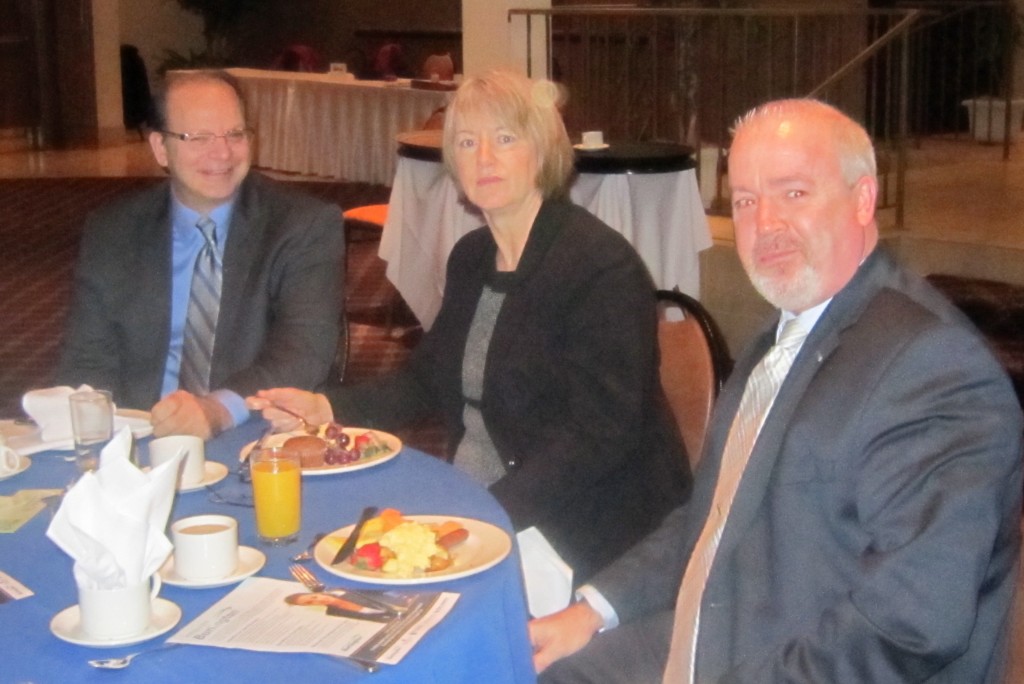 City administration leadership team: city manager Jeff Fielding on the left with general manager community and corporate services, centre and general manager, development and infrastructure Scott Stewart on the right. The two general managers didn’t always pull with the same level of effort. General manager Kim Phillips, who had a choppy working relationship with Fielding, said staff wanted to have a caricature made up to present to Jeff but there wasn’t time to get it done. “Had we managed to put it together it would have been of Jeff on a bicycle heading towards a golf course with his golf clubs over his shoulders peddling by city owned buildings with for sale signs on them.
Jeff Fielding was close to radical in his approach to many of the tasks he took on. He understood fully the need for the municipal sector to change its business model; he knew that what we are currently doing is not sustainable.
Taking the job opportunity as city manager in Calgary gives Jeff Fielding the opportunity to work with a mayor who also knows the current municipal business model will not work – it isn’t working now. Fielding was very comfortable in Burlington; taking the job of city manager for Burlington was to be his last move before retirement. The fertile soil for change that he thought he saw turned out to be thin with nowhere near the nutrients to bring about real growth.
As one watched his behaviour at Standing Committee meetings and became aware of just how big his changes were – it was breath taking. On an occasion when a discussion was taking place in Fielding’s office – almost every square inch was covered with pieces of papers with ideas, comments and questions. There was this itch to write down as much as I could read and to whip out the camera and start clicking away. There wasn’t an issue that Fielding would not at least look at.
 Former city manager Jeff Fielding, on the left, was always on hand with Mayor Rick Goldring. Here Goldring explains to Kilbride area residents what was being done and the time frames the repair crews were working to in their community. He didn’t see any reason for the city to be in the golf club business – we think he was right on that one. He had a team of smart people begin a study of the city’s space needs – asked first what do we have and then asked staff to set out what was needed now and into the future – and then began looking for ways to leverage the city hall property.
Fielding was convinced that city owned parking lots had much more value in them than was being realized and he was constantly looking for ways to get at that value and make it work for the city.
He understood fully, more than most of the city’s population, the importance of culture to the city and the need to hype the Performing Arts Centre and work with the Art Centre to get more value – and traffic – to those locations.
City council wasn’t able to find the money to hire a full time Cultural Development manager in the 2014 budget. During the final delegation from the Arts Collective, Fielding turned and told the speaker that he would look for a way to find the money to hire that person. “I can’t promise I will find the dollars – but I will try” which is more than any of the current council members said.
 Jeff Fielding, on the left, didn’t take prisoners. He let lawyer Glenn Grenier,second from the left, who described himself as an expert on the legislation that governs air parks in Canada, know that Burlington wasn’t buying his story. City solicitor Nancy Shea Nicol and Blake Hurley look on. After the meeting Fielding had some stiff words for Grenier while city solicitor Nancy Shea Nicol and staff lawyer Blake Hurley looked on.
Fielding was direct, blunt and didn’t have much time for the “slackers”. On the other hand he recognized real talent which he nurtured and developed. There are a couple of dozen people on the city payroll who are bigger and better people today than they were the day Fielding arrived. For them his decision to leave now was extremely disappointing.
He turned the way the city does its budget upside down and took staff into a Results Based Accountability (RBA) approach where the departmental silos would be merged in a way that would be exceptionally difficult for some staff.
When asked what would happen to the RBA work that had been done Fielding told this reporter that all the basic budget work is completed and he felt staff could complete the shift. That is a stretch by any definition.
Fielding has made arrangements for people in London where he introduced the RBA approach to work with Burlington’s financial team and that help will certainly be useful. What Fielding has done is take a team of people in probably the best run department in the city and convince them to go way out on a limb with him and do something significantly different. This kind of thing does not happen in the municipal world.
The financial people were excited, motivated; pumped if you will, and at a critical time their coach and mentor walks off the field. As much as we admire Fielding –that decision is difficult to fathom and disappointing as well . The city needed another year to get RBA in place and functioning – it was within Fielding’s power to do that. He chose not to.
Fielding did say that he would have liked to have had one more year in Burlington – the city would certainly have liked to have had him for that additional twelve months. One wonders if the Mayor told Fielding that he was not prepared to accept the resignation at this time and sent him back to his desk. Too much to ask for I guess
Rick Goldring told staff at the reception that the day he advised his fellow council members that Fielding was leaving he saw an event on YouTube where the Mayor of Calgary was introducing Jeff as their new city manager. “I felt”, said the Mayor, “like the guy who breaks up with a girl one night and the next day sees her in the arms of some other guy”.
It was both a shock and a profound disappointment to everyone. One wonders why we did not see this coming.
Fielding raised the bar said the Mayor in his remarks and Fielding certainly did that. The problem was that he didn’t stick around long enough to get his team to the point where they could get over that bar day in and day out. Budget time in 2015 is going to have more than the usual bumps in the road.
 Former city manager Jeff Fielding was strong enough to wear his emotions on his sleeve. Made a difference while he was here. Fielding who is an exceptionally emotional man – came close to losing it when he spoke to the team that he led and explained that there are occasions when opportunities come along and you take them. He added that his decision to move from London to Burlington was a family decision. His wife works with the regional government and the two boys are attending Burlington schools. Fielding took out a golf club membership – this was home.
The decision to move to Calgary was not, Fielding explained, a family decision. He was going to Calgary on his own and would commute to be with his family.
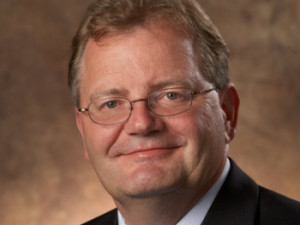 Pat Moyle, interim city manager, probably until NEXT June, brings years of experience in municipal government having served as Regional CAO and with the Association of Municipalities in Ontario. A steady hand during a period of change. Scott Stewart was the “ying” to Fielding’s “yang”. Fielding looked at things from the 30,000 foot level and could see beyond the horizon and relied on Stewart to execute on the decisions that were made. The two were a remarkable team – the only good luck in all this for Burlington is that Fielding didn’t take Scott Stewart with him.
There are always complex reasons for changes made in one’s life. Fielding was pretty sure that the move to Burlington would be the capstone of his career – but then the phone call from Calgary came and Fielding was unable to say no to an opportunity to return to the city where he once worked in the planning department. There appears to be some unfinished business in Calgary that has cost Burlington the most dynamic and effective administrative leader we have seen for a long time.

 By Ray Rivers By Ray Rivers
May 16, 2014
BURLINGTON, ON.
Canada was one of the first nations to respond to the civil unrest in Kiev and the Russian invasion of Crimea. We recalled our ambassador to Russia, dispatched foreign minister Baird to visit Kiev, booted out a few Russian soldiers visiting us, offered a tiny amount of economic and humanitarian aid and sent over a couple of military observers. This was all announced with the sober deportment which Mr. Harper so capably captures.
 Civic engagement – people giving voice to their aspirations. The Ukrainian situation is complicated. Once considered the bread-basket of Europe, the Ukraine has become an economic basket-case, caught between an ever expanding EU and a newly oil-rich Russia intent on re-establishing the old Soviet Union. It is one of the ironies of civilization that the Ukraine is caught in this potentially matricidal tragedy, having been the cradle of birth for the Russian people. For most of its forty-four thousand year history the Ukrainian people were made captive by any and all invaders, including Huns, Mongols and Turks, the Poles and Swedish Deluge, the Austrian-Hungarian empire, Hitler and most recently the USSR, where it acquired its current geographical dimensions.
Crimea will become part of the Russian Federation, every reasonable person sees that inevitability. The question is whether Russia is content with its acquisition of this tiny peninsula, or whether it will find pretext to invade other parts of the Ukraine. The entire western effort focused on Crimea is about keeping Mr. Putin’s attention there. This hopefully will stall him in order for the Ukrainians to assemble enough of a defence to hold onto the rest of their country.
Mr. Putin is upset. His dreams of expansion have been set back by the impending Ukrainian decision to favour the EU over his dream of a new USSR. It is truly unfortunate that the west didn’t have the foresight to envision this situation. It might have been possible to more fully invite Russia into the European community of nations, such that Mr. Putin would not feel threatened by a pro-west Ukraine. Russia faces the reality of having lost all of its former Warsaw Pact satellites to the EU, and more importantly to NATO. From Putin’s perspective securing his military base in Crimea was the very minimum he should do.
There was a time when Canada was viewed as an honest broker. Lester Pearson won the Nobel Peace prize in 1957, for his trusted independent voice of reason. Today Canada’s foreign policy is about marketing our natural resources, and shamelessly pandering to the ethnic vote back home. So nobody listens to us anymore, and certainly not Mr. Putin. For all the PM’s bluster about the invasion of Crimea, Canada’s only substantial contribution will be through NATO action, should that become necessary.
 But we should not deprecate the fact that we were among the first to get involved. We closed our embassy to register our disapproval at the slaughter of protesters. Then, following the flight of besieged president Yanukoyvich, we provided early moral support for the new administration in Kiev, Mr. Harper has a habit of jumping into situations early and this time he got it right and demonstrated leadership. But we should not deprecate the fact that we were among the first to get involved. We closed our embassy to register our disapproval at the slaughter of protesters. Then, following the flight of besieged president Yanukoyvich, we provided early moral support for the new administration in Kiev, Mr. Harper has a habit of jumping into situations early and this time he got it right and demonstrated leadership.
And there is a lesson from Crimea for Mr. Harper – in fact for all of us. Quebec having just announced elections is busy preparing for its new sovereignty referendum, should the PQ win. In response, it appears the PM has come to life, and begun meeting with parliamentary opposition leaders and provincial premiers about his next steps. After all Crimea’s future in the Ukraine will be determined by a unilateral referendum, not unlike those used in the last two Quebec votes on sovereignty.
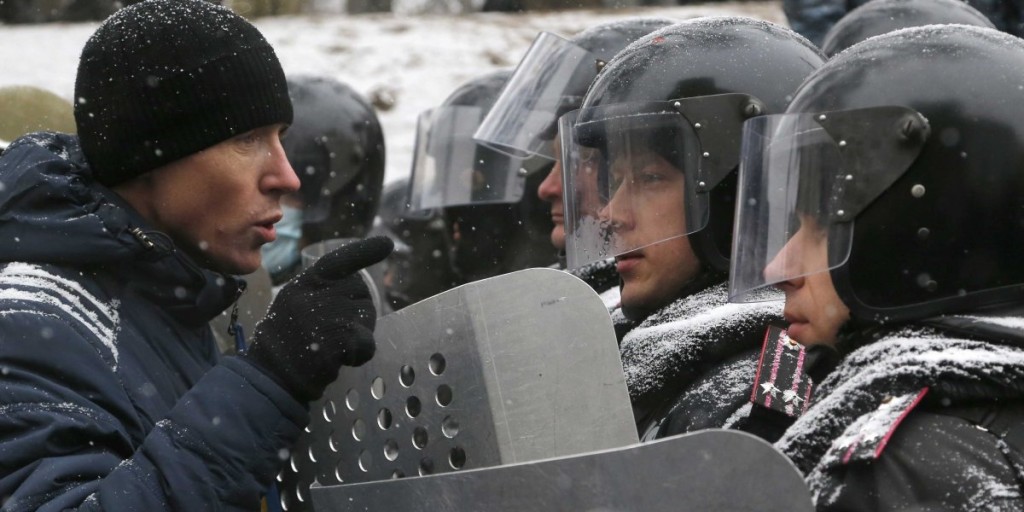 Democracy in the Ukraine; what a difference between this and the election Ontario is currently having. Oh what a tangled web they’ll weave – and all they want is to is secede.
 Ray Rivers writes weekly on both federal and provincial politics, applying his more than 25 years as a federal bureaucrat to his thinking. Rivers was a candidate for provincial office in Burlington where he ran against Cam Jackson in 1995, the year Mike Harris and the Common Sense Revolution swept the province. He developed the current policy process for the Ontario Liberal Party. Rivers is of Ukrainian extraction – for him this is up close and personal. Ray Rivers writes weekly on both federal and provincial politics, applying his more than 25 years as a federal bureaucrat to his thinking. Rivers was a candidate for provincial office in Burlington where he ran against Cam Jackson in 1995, the year Mike Harris and the Common Sense Revolution swept the province. He developed the current policy process for the Ontario Liberal Party. Rivers is of Ukrainian extraction – for him this is up close and personal.
Background links:
Canada’s Ukraine Contribution Russia vs Nazis
Legal Issues in Ukraine Russian View Kissinger Ukrainian Feed Mulroney on Putin Losing Putin –
Russia Lost the War Ukrainian Diaspora Ukraine History Yanukoyvich Corruption The Crimea Case

 By Pepper Parr By Pepper Parr
May 16, 2014
BURLINGTON, ON.
There were 46 comments in the newspaper on a web site article we published when we said we were ceasing publication. Not one negative comment amongst them.
In hindsight we should have said we were suspending publication.
I met with a number of people after the announcement and was asked by several if there was not some way I could continue. At the city council meeting of April 28th Councillor Meed Ward announced that we have “for a variety of reasons” stopped publishing, she didn’t elaborate. You are entitled to know what those reasons were.
On May 30th, I will have hip replacement done at St. Joseph Hospital in Hamilton. I have a great surgeon at a hospital where the service and attitude is superb.
From the point at which it became evident a hip replacement was necessary to the date the surgery is to be done was less than 90 days – which I felt was satisfactory. That doesn’t mean there is no pain. Hurts likes Hades and I’ve still not gotten the hang of the cane my wife got for me.
Having a disabled card for my car is a god-send. I can park right outside city hall and most buildings that I have to get to – and I don’t have to pay for the parking. Sweet!
I felt I was unable to do the job I had set out to do. Add to that the libel notices that were served on us by the Air Park Inc., and I wondered if I could keep the newspaper on a web site going and fight the Air Park Inc. action.
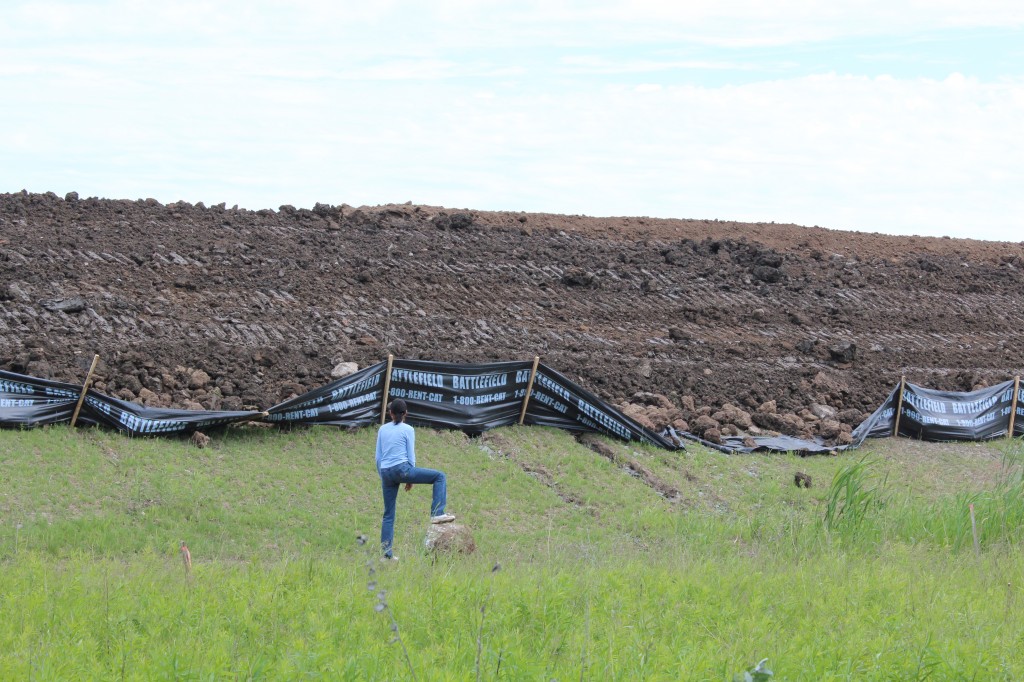 Somehow the owner of the Burlington Executive Airpark convinced everyone that his plans to develop his property came under federal jurisdiction and that the city had no say in what they chose to do. This location was to be the site of a helicopter operation. The owner of the adjacent property is standing on her property line. Many wonder why a corporation can do this to a neighbouring property. My wife found the stress of the legal action difficult to handle. She is the reason I came to this city and I reluctantly decided to cease publishing, at least until the hip surgery was complete and I was able to get around. Everyone tells me I will be back on my fee in no time once the surgery is done – and I certainly hope they are right.
With the announcement of the decision to cease publishing was posted something astonishing happened. There were phone calls. A member of council called to ensure that it was not a delayed April fool’s joke.
There were emails – more than 65 to me personally.
There were comments from readers; more than 46. Not one negative amongst them.
The announcement was made on the Sunday and traffic for the Monday was the largest in our three year history.
A number of people wanted to meet with me. All wanted to know how they could help. The clincher was the delegation that called at the house. Three people, all from the same downtown part of the city, rang the doorbell and asked what it would take for me to resume publishing. I said I would re-think my position.
The Gazette has resumed publishing. I am not going to be able to cover as much as I did in the past until the surgery is done and the recovery is complete.
As for the Air Park Inc., we became aware that a reader who had made a comment on the web site had been served with a libel notice and we were served with a second notice. Then third.
We were fortunate enough to be able to get legal opinions from two exceptionally prominent lawyers who said three things. (1) Peter Wells, the lawyer acting for the Air Park Inc., is not a libel lawyer; he doesn’t know that field of law. (2) You did not libel the Air Park Inc., and you should fight this battle. (3) The owner of the Air Park is a bully.
We have not been sued as yet and have not hired the lawyer that will defend us should we be sued. The lawyer we intend to use is one of the best there is in the field. He will not be cheap – the vacation this summer will be very short and inexpensive.
We have a serious problem when a citizen, running for public office, responds to an article with an opinion and is then chased because someone thinks they have been libeled. That is called libel chill – and it can be effective.
The Air Park Inc., situation cuts to the very core of citizen administration. Does the city have the right to enact bylaws and does the Air Park have the right to flaunt those bylaws claiming they do not apply to them? They certainly thought so. But Justice Murray declared they are wrong and that they must adhere to the bylaw – and pay a large portion of the city’s legal costs as well.
The Air Park, as is their right, chose to appeal Justice Murray’s decision. That appeal is going to be heard before a three member panel of the Ontario Court of Appeals at Osgoode Hall June 11th. The city should have an answer a few weeks after the appeal hearing.
Legal counsel for the Air Park has provided us with the working of the apology they required us to publish. We have set that apology out for readers in a separate article.
The Burlington Gazette will not be publishing an apology. The Air Park can sue if they wish and we will defend our actions in a court of law. It is our belief that the Air Park Inc. wants to expunge any record of what they have done and they have served us with a notice that if we do not remove the material we published they will sue.
We will work with Vanessa Warren, a candidate for ward 6, who also does not believe that she libelled anyone. We agree with her. We will work with the members of the Rural Burlington Greenbelt Coalition (RBGC) who were also served with libel notices. We will not be removing any of the material we published unless ordered to do so by a Court and we will continue to cover one of the most significant events that has taken place that impact on the long term development of the city.
We have asked for an opportunity to interview Vince Rossi, president of Air Park Inc. on two occasions. Mr. Rossi has not been available. He appears to prefer to put his story on the Air Park web site where he can control the content.
The air park is not the only issue of concern. The changes taking place with the Economic Development Corporation, the provincial election, the development potential for the Brant Street Plaza (No-frills and Tim Horton`s are currently located there).
The loss of a city manager that brought about significant changes with the way city hall will run the city – what we all thought was going to be a 60 month run came to a halt after 26 months and many are still figuring out what we do now?
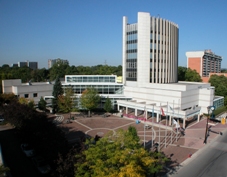 Is there a new city hall in Burlington’s future? Pressing the city to make their community engagement charter real for the citizens of Burlington.
Following the municipal election and reporting to the voters what we have observed of this council during the past three years and interviewing those people who have put their names forward for public office.
It is nice to be back.

 By Ray Rivers By Ray Rivers
April 24, 2014
BURLINGTON, ON.
The Harper government is having one helluva time getting its stuff past the Supreme Court. Last month it was dealt another blow. More like ‘smoked’ than ‘blown’ actually, as another piece of Mr. Harper’s psychedelic puzzle for controlling whacky-tobaccy went up in smoke and got knocked into the ash can of Canadian drug history.
I can understand the PM’s fears. If sick people, whom a doctor has determined require access to the medicinal herb, continue growing their own, as they have been doing legally, it might lead to chaos. Gangland killings will become as commonplace as they are in Mexico; children clipping buds off their parent’s pot plants will get hooked for life; food prices will skyrocket as dopers feed their munchies; and Rob Ford will do another Hollywood in an Etobicoke apartment. Oh wait – that was crack-cocaine!
So our sober-faced PM, who claims to never have experienced the pleasure of a toke of nirvana, decided to axe all the private mom and pop grow-ops in one fell swoop. Only commercial outfits would henceforth be allowed to grow the heavenly herb, under the ever-watchful eye of Health Canada. There is even a rumour that some chemist called Heisenberg will be brought up from New Mexico to monitor weed quality. Marijuana, like lettuce, spinach and tomatoes, is susceptible to moulds and bacteria after all, so you can’t let just any backyard gardeners grow their own.
 There are tens of thousands of people using marijuana under prescriptions from doctors for medical reasons And pesticides are a definite no-no. Dope-heads learned that lesson the hard way back in the 70s’ when the US drug enforcement agency (DEA) was forcing the Federales to aerial spray Mexican crops with a lethal herbicide, never thinking that the farmers were going to harvest and sell the pot anyway. As that velvety smooth Acapulco Gold made it’s way to markets all the way up here, the DEA got a whiff of what it had done and started freaking out.
So the middlers and dealers were asked to send some of the evil weed for government testing. And sure enough, almost a quarter of the samples had been contaminated by that deadly pulmonary toxin, Paraquat. Well that was enough to make you stop smoking your ‘shit’. No wonder Clinton never inhaled.
It is estimated that the Canadian market for medical mary-jane in the next few years could reach almost half a million users. So why not turn this growing enterprise into a big corporate business? That way taxes could be collected to help keep dope smokers in the expensive new private prisons which Mr. Harper’s government is building for them? Increasing the commercial supply of grass makes perfect sense for a government, otherwise committed to stamping out reefer madness.
 Managing pain is one of the reasons people get a prescription to use marijuana for medical reasons. Then one of the new commercial grass-growing ops, with the almost hallucinogenic inducing name of Greenleaf messed up. Whether it was pesticide use, bacterial contamination, or unintentionally over-strength THC (the fun component) hasn’t been confirmed. But if you or your buds ordered your medical buds from Greenleaf – stuff with the cool handle of ‘Purple Kush’ – yeah you read that right – you have to send it smack back and the company will ship you a bag of fresh ganga in return.
Then Health Canada tells us that if you’ve already “bogarted” all your Purple Kush – and not blown your mind yet – don’t sweat it because it’s no big deal. Is it any wonder the Tory attack ads tell us that Justin Trudeau’s stand on marijuana legalization lacks judgement?
 Ray Rivers writes weekly on both federal and provincial politics, applying his more than 25 years as a federal bureaucrat to his thinking. Rivers was a candidate for provincial office in Burlington where he ran against Cam Jackson in 1995, the year Mike Harris and the Common Sense Revolution swept the province. He developed the current policy process for the Ontario Liberal Party. Ray Rivers writes weekly on both federal and provincial politics, applying his more than 25 years as a federal bureaucrat to his thinking. Rivers was a candidate for provincial office in Burlington where he ran against Cam Jackson in 1995, the year Mike Harris and the Common Sense Revolution swept the province. He developed the current policy process for the Ontario Liberal Party.
Background links:
Court Decision Recall
Purple Kush
Quality Product
Medical Marijuana Colorado Grow Your Own Paraquat More Paraquat Market Potential

 By Staff By Staff
April 17, 2014
BURLINGTON, ON.
The kids love them, grandparents have a great time hiding the coloured eggs and parents learn to deal with the sugar high that follows that Friday morning fun.
It’s something we do – harmless but at some point those children should hear the story and let them decide as they grow what they choose to believe.
But there is another culturally historic story behind those Easter eggs.
 It’s not the forty loaves story is it? Easter eggs, also called Paschal eggs, are decorated eggs that are often given to celebrate Easter or springtime. As such, Easter eggs are common during the season of Eastertide. The oldest tradition is to use dyed and painted chicken eggs, but a modern custom is to substitute chocolate eggs, or plastic eggs filled with confectionery such as jelly beans. Eggs, in general, were a traditional symbol of fertility, and rebirth.
In Christianity, the celebration of Eastertide includes Easter eggs symbolizing the empty tomb of Jesus: though an egg appears to be like the stone of a tomb, a bird hatches from it with life; similarly, the Easter egg, for Christians, is a reminder that Jesus rose from the grave, and that those who believe will also experience eternal life.
One can argue for years over the concept of a risen Christ – but the facts are, there was a man who was crucified – his name was Jesus. The rest of the Christian tradition is a matter of faith.

 By Ray Rivers By Ray Rivers
April 17, 2014
BURLINGTON, ON.
Skeptics will point to the winter we’ve just experienced and ask: “what global warming”? But that is not what the International Panel on Climate Change (IPCC) is saying. They’re saying global climate change is real and getting worse, and that there is still time to take action to help mitigate it. According to the IPCC, global greenhouse gas emissions (GHG) grew over the last decade at double the rate of the previous three decades and over 60% since 1990.
 Smoke stacks in Hamilton. I recall preparing materials, back In1992, for Canada’s Environment Minister, Jean Charest, as he was heading out to represent us at the Rio Earth Summit. Canada played a leadership role in promoting action on climate change there. We did so again in 1997 when we signed the Kyoto protocol; and again when we ratified it in 2002. But Canada stopped trying to reduce its GHG emissions once Mr. Harper formed the government in 2006.
Not that our trying had ever amounted to much. The Chretien/Martin governments’ various strategies and programs mostly went nowhere and the goals we’d set for ourselves became ever more elusive.
When it was clear we’d never reach our goals, Mr. Harper changed the goal posts, and pulled Canada out of Kyoto once he had a majority in 2011. Our PM never seemed to believe in climate change anyway, and his every action confirms that. So it was not a surprise when we saw his vision of Canada as the Saudi Arabia of the north, exploiting and exporting fossil fuels to the world.
Some say the 1997 Kyoto Protocol was flawed since the developing nations were not required to reduce their emissions. The US Congress passed a resolution against ratifying it for that reason, despite the role played by the US in drafting the Protocol. Proponents of the Protocol arguing that major economies should lead by example, something they haven’t done – at least not in the case of Canada or the USA. By contrast, European nations have at least struggled to reduce and maintain their emissions.
At the Rio Earth Summit in 1992, there was an emerging consensus about climate change and the need to change our ways. World leaders foresaw that one day the developing world would surpass North America and Europe in carbon emissions. That day has come. China increased its CO2 emissions astronomically, such that by 2006 it had become the world’s largest greenhouse gas emitter.
Electricity plants fueled by coal are the most polluting of all sources and there are about a thousand or so plants in the works, globally. China’s coal plants make up a whacking 15% of global emissions and it gets two-thirds of all its electricity from burning coal. As a consequence some three-quarters of a million people die every year in China just from coal related health effects.
So it was a good piece of news, in this sombre picture, that Ontario announced it has entirely phased out electricity production from coal, I was the first jurisdiction in North America to do so, joining British Columbia and Quebec which produce electricity without coal. Natural gas, even though it is less polluting, will still be kept in the quiver to complement solar, wind, hydro nuclear and biomass. The province isn’t off fossil fuels entirely, just the dirtiest one.
The provincial government’s renewable energy program has been cited by so many people as the source of high electricity bills that everybody is starting to believe it. The truth is that only a small portion of the electricity rate increases reflect switching from coal to the alternatives. Why would we expect prices for electrical energy to stay constant? Shouldn’t we keep this in perspective – get a grip? Have we checked the gasoline pump prices lately? Didn’t natural gas prices jump up by 40% this year?
And then somebody brings up that costly McGuinty gas plant fiasco, from a couple years ago, and we all just get angry about the rates again. Reading the latest IPCC report can be pretty depressing, even more than ruminating about escalating energy prices. If you live in Ontario you can take a little comfort from the fact that we were the only Canadian province to significantly reduce GHG emissions over the last decade – a little shining star in an otherwise dark and troubled sky.
 If this kind of melting keeps happening – climate will be changed to the point where we cannot recover.
 Ray Rivers writes weekly on both federal and provincial politics, applying his more than 25 years as a federal bureaucrat to his thinking. Rivers was a candidate for provincial office in Burlington where he ran against Cam Jackson in 1995, the year Mike Harris and the Common Sense Revolution swept the province. He developed the current policy process for the Ontario Liberal Party. Ray Rivers writes weekly on both federal and provincial politics, applying his more than 25 years as a federal bureaucrat to his thinking. Rivers was a candidate for provincial office in Burlington where he ran against Cam Jackson in 1995, the year Mike Harris and the Common Sense Revolution swept the province. He developed the current policy process for the Ontario Liberal Party.
Background links:
Carbon Emissions
Clean Energy An Anti-apartheid Approach Germany’s Green Dreams B.C.’s LNG IPCC Report Harrison Ford Conference Board
Carbon Emissions CO2 From New Zealand Climate Change Olympics Measuring What Matters Tipping Points
Provincial Emissions GHG per Capital
Editor’s note: Someone recently said, on one of the David Suzuki programs, that the amount of energy used when two Google searches are done is equivalent to the amount of energy needed to boil enough water to make a cup of team. The speaker was arguing that our focus should not be on the supply side of the energy question but rather on the demand side.

 By Pepper Parr By Pepper Parr
April 15, 2014.
BURLINGTON, ON.
Mayor Goldring noticed Thursday afternoon that he had an appointment on his calendar with the city manager – it wasn’t one he was aware of and thought he might have gotten something mixed up.
Perhaps he wishes there had been a mix up – when the meeting did take place Jeff Fielding, who has been with the city for just 26 months, advised the Mayor that he was going to accept a position as the city manager for the city of Calgary.
That news was a blow to many, perhaps not all that bothersome for some members of Council who may have experienced some indigestion as a result of Fielding’s style. He has said to this council on more than one occasion to “just do your jobs”.
Fielding, sold himself to Calgary as “pretty much a financial conservative,” and touted his detailed service-based approach as designed for public digestion. “It begins a dialogue within the community about whether they’re getting value or not,” he said.
Calgary Mayor Naheed Nenshi, one of the most admired Mayors in the country, held Calgary together during the Spring floods in Alberta. He has the electorate in that city in the palm of his hand; few council members dare oppose what he suggests. Staff in Calgary are said to bridle at some of his approaches. Burlington’s Mayor was putty for Fielding – he will have his hands more than full with Nenshi.
The Calgary decision to hire Fielding was the culmination of a months-long competition that included international applicants and at least two City of Calgary general managers. So – while we didn’t know it, Fielding was on his way out the door before we had finalized our budget for 2014.
Calgary is not new to Fielding – he once worked in that city’s planning department more than a decade ago.
Calgary is a different municipal beast: it is western Canada’s largest city that keeps building new suburbs on farm fields.
Fielding was a great breath of fresh air for Burlington. He brought focus and discipline to just about everything. There are more than a dozen staff members, not all senior people, who have grown professionally under Fielding’s guiding hand.
They will miss him both personally and professionally and now they have to try and pick up from where he has left them – and Fielding hasn’t exactly left the city in great shape.
The approach to service based budgeting that he convinced the city to take on is far from complete and while the city has some top notch people working on getting the budget for 2015 set up for the new approach – none are experts and don’t bring the almost evangelical drive Fielding brought to making the people who decide responsible and accountable for their decisions.
It is going to be very difficult to maintain the progress that has been made to date on the service based budget concept. We are newbies at this and we don’t have a leader with the depth needed to put it into place. We will soldier through – but it would have been easier with Fielding at the helm.
The city is on the hook for a $300,000 – three year contract for the services provided by Angus Reid and his son’s Critical Vision operation. Fielding knew he needed faster feedback from the public and called the tool “Insight Burlington”. His staff was in the process of fine tuning the service. So far all his team had managed to do was get one question out. That tool might sit on the shelf with Fielding gone.
Perhaps that three year contract with Critical Vision is similar to the contract Fielding had with the city. I thought a five year contract ran for sixty month – Fielding has put in 26 months. Personally, I argue that having taken the city down the service based budgeting path we knew little about, Fielding had an obligation to stick around long enough to complete the job – another year would make a big difference.
During the last budget Fielding told the cultural community he would do his best to find the funds needed to hire a Cultural Manager. Kiss that one goodbye.
The city will be into mediation on the legal problems left over from the construction of the pier – the project that went from $6.7 million in 2006 and ballooned to more than $14 million and it isn’t over yet.
Fielding took the financial file and the legal file out of the hands of General Manager Kim Phillips – left her with Parks and Recreation and fire stations and was the lead hand on the working relationship with the city’s solicitor and the lawyers handling the city’s law suits. Those lawyers started off suing on behalf of the city and now find that the tables have turned and they are defending themselves against the claims of the original contractor. Fielding had meetings with the lawyers the city engaged to map out a mediation strategy. He was expected to be the lead talker for the city. We would have been well served with him at the table.
Fielding was deeply involved in the longer term thinking on how we get something useful out of the downtown core and had a team looking at what we have in the way of physical assets and what we don’t have, including a city hall that doesn’t have room for all those people on the payroll.
There have been renewed discussions with McMaster University and the use of the Elizabeth Street parking lot – some of the people involved in those discussions were stunned when they read the news of Fielding’s departure.
Fielding did a superb job in maintaining the staff compliment and held salary increases to 1%. He could be really hardnosed when it was necessary. The Seniors’ are going to miss him – he gave them everything but a new kitchen sink for their operation.
Burlington paid Fielding $249,940,24 in 2013 plus $8,898.60 in taxable benefits. Calgary is going to pay him $319,000 plus a possible 10% bonus.
So where does Burlington go from here? Does the city call in a recruiting company and ask them to begin running ads? Does Council do what they did when they parted ways with Roman Martiuk and have General Managers Stewart and Phillips carry the ball until Fielding was hired?
Scott Stewart was one of the applicants for the job of city manager and got beat out by Fielding. Is Stewart ready now for the top job? He has been doing a large part of it for the past year; carrying a lot of the weight this past six months. Fielding has done a great job of grooming Stewart.
City Council will meet in a Special session Tuesday after the scheduled Corporate and Community Services meeting. That will be a closed session with perhaps Executive Director of Human Resources Roy Male serving as the pro tem Clerk.
This is a vital meeting for this council. There are those who believe the Mayor is on for someone to serve as an interim city manager while Councillor Sharman has something up his sleeve but wasn’t prepared to say anything more than that.
Mayor Goldring has described Sharman as the best strategic thinker on council and relies heavily on his advice – which Sharman very willingly gives.
Council does have one other alternative. Former city manager Roman Martiuk is looking for work – perhaps he would take on a short term assignment.
 Back in 2012 the city was given an opportunity to accept an offer from the insurance company that carried the performance bond to assure the completion of the pier. Council turned that one down – with very little time spent considering the offer. They instead issued a new tender – and we paid even more for the pier than originally planned. Back in 2012 the city was given an opportunity to accept an offer from the insurance company that carried the performance bond to assure the completion of the pier. Council turned that one down – with very little time spent considering the offer. They instead issued a new tender – and we paid even more for the pier than originally planned.
There is an opportunity for a really sensible decision to be made on Tuesday. Don’t blow this one.
The last word on this sad situation for today comes from a reader’s comment: High performance executives do not leave for money. They leave because they are frustrated or handicapped/handcuffed from achieving success by the very culture of the company.
That sounds a lot like why Frank McKeown quit as the Mayor’s Chief of Staff.
Fielding leaves his desk May 16 and starts work in Calgary June 2, 2014′

 By Ray Rivers By Ray Rivers
April 10, 2014
BURLINGTON, ON.
It is tax season and I normally use an XL spreadsheet to do mine, but this year the complications made that almost prohibitive. So I tried to buy a tax software package, on-line, at the CRA website. The first one, H&R Block, wouldn’t open for a Mac, even though it was listed for the Mac. The second, Turbo Tax, somehow went haywire mis-reading the information I had entered.
So I ended up retreating to my spreadsheet and working into the wee hours to finish the return. Now it might have been that the TV was still on, that the hour was late, or that I’d poured myself too much of that Scottish medicinal nightcap. But as I started dozing off I distinctly recall hearing the conversation below…(Editor’s note: In your dreams Mr. Rivers …in your dreams.)
Michael Wilson: Oh come on now – that is rich. You can’t blame me. I didn’t know that Mr. Mulroney’s income tax reforms would impact the middle class the way it did – creating this growing divide between the rich and the rest. I mean we just thought it was tax simplification.
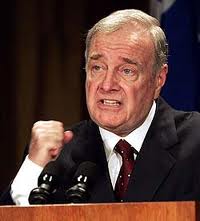 Paul Martin – Finance Minister in the Chretien government Paul Martin: Simplification – that is a joke – with all that tax credit nonsense you introduced. The only simplification was reducing the tax brackets so the rich paid less in taxes and the middle class picked up the difference. Oh, and then you made accountants rich as well, since ordinary people could no longer complete those obtuse and complicated returns.
Jim Flaherty: So you were Jean Chretien’s miracle worker, the great Liberal deficit slayer – why didn’t you change that. I don’t know if you remember, but it was our John Diefenbaker who set up the Carter Tax Commission back in the ’60’s. Their report was seen as a landmark everywhere, except in Canada. Your Pierre Trudeau largely ignored the report, pressured by big business and the well-heeled interests who used to finance your party.
Wilson: I remember that. Carter’s work was world renowned – still is. A dollar of income is a dollar, or something like that – treat all income the same. He also showed how he could reduce the taxes of the lowest income folks and still keep the budget balanced.
Martin: Something you never did; balance the budget. And as John Turner once said, Trudeau had no choice, he had to back away from most of the recommendations. But at least he kept the middle class intact, retaining the progressive rates and higher taxes for the wealthy, till the early eighties, anyway.
Flaherty: Well to be fair. He wasn’t alone – everyone was lowering taxes for the rich in the ’80’s and ’90’s. It was the Reagan/Thatcher ‘trickle-down economics’ flavour of the day – you know let the rich keep most of their income and that money will eventually trickle down to the rest of the economy. I mean, I’m a conservative but I don’t believe that horse manure. And they increased the debt in order to lower taxes. Canada’s debt mushroomed in the latter Trudeau years and then our guys just kept digging an even bigger hole – until Paul, here, got the deficits under control.
Martin: Thanks. And back at you though I think you should have run a tighter ship, Jim, especially when you were Mike Harris’ finance minister.
 Michael Wilson – Finance Minister in the Mulroney government Wilson: Justin Trudeau has talked a lot about the middle class, do you think he has tax reform in mind? The least he could do is come up with a simpler tax return. I can’t see how the average tax payer can ever fill out today’s form. No wonder people hate taxes.
Flaherty: I’ve been thinking about that. Here look at this – a one page tax return where you add all your income together – like the Carter tax folks said ‘’a buck is a buck’ – so treat it that way. Then allow for transfers to your family or charity. We’d need some new rules on that.
|
Income Tax Calculation
|
Item Amount
|
|
Gross Income from all sources
|
|
|
Transfers to family and others
|
|
|
Deferred Income (retirement, lotteries, etc)
|
|
| Net Income |
|
|
Taxes Payable (use tax table)
|
|
| Taxes paid by installment |
Wilson: Right and then I see you have income deferments, like retirement savings, maybe education and home buying as well.
Martin: And then you just subtract those items from the income, calculate the taxes from a tax table and presto. If you paid more in tax installments or had deductions taken off at work, you get a refund, just like we do now. Do it all on-line as we do the GST now.
Flaherty: Well it really makes sense. I mean I don’t see why someone earning capital gains from selling investments or a second property should pay a lower rate of taxes than the poor slob slugging his guts out on the assembly line. And it makes it all simpler too.
Martin: And those folks with the big capital investments are mostly among the top 10% income earners – so why do they need a break? So we get rid of all the regular deductions,and say good bye to all that credit nonsense, which even I have trouble figuring out.
 Jim Flaherty – a finance minister in a Harper government. Flaherty: And I’d be tempted to drop deductions for health care, charitable and political donations from the transfers line. I mean everybody gets universal health care and I think charities and political parties ought to attract donations without using the tax system. We’d be better off to directly subsidize them, I think.
Martin: You mean you want to bring back public funding for political parties?
Wilson: You know what, I like this form Jim. Why didn’t I think of that when I was Finance Minster? Hey, let’s call it tax simplification.
 Ray Rivers writes weekly on both federal and provincial politics, applying his more than 25 years as a federal bureaucrat to his thinking. Rivers was a candidate for provincial office in Burlington where he ran against Cam Jackson in 1995, the year Mike Harris and the Common Sense Revolution swept the province. He developed the current policy process for the Ontario Liberal Party. Ray Rivers writes weekly on both federal and provincial politics, applying his more than 25 years as a federal bureaucrat to his thinking. Rivers was a candidate for provincial office in Burlington where he ran against Cam Jackson in 1995, the year Mike Harris and the Common Sense Revolution swept the province. He developed the current policy process for the Ontario Liberal Party.
Background links:
Need An Accountant Buck is a Buck
Carter Commission on Taxation The Rich
The Flat Tax Alberta’s Flat Tax
Family Taxation Tax Policy (for serious readers)

 By Ray Rivers By Ray Rivers
April 8, 2014
BURLINGTON, ON.
While we held our breath Monday night, Quebecers chose to postpone their discussion on sovereignty and move on with their lives, largely shunning the two competing separatist parties for the federalist Liberals.
There are those who rationalize that the push for an independent Quebec may have been just a generational thing. As the generation of Lévesque, Bouchard, Parizeau and Marois pass, the progressive leaders of Quebec’s ‘Quiet Revolution’, so will the sovereignty debate they say.
Outgoing Premier Pauline Marois mused that she had erred in raising the sovereignty issue during the campaign. However, for a separatist party, committed to independence, to not have talked about their end goal would have been deceptive and dishonest. And there were other factors for her failure, including a fractious campaign in which she played the desperate political leader, thrashing about, trying to blame somebody else for her inescapable tumble.
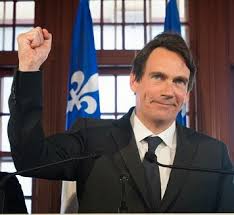 That fist in the air was the one thing the Parti Quebecois didn’t need – now they may have to live with Pierre Karl Peladeau as Leader of the Opposition. It would be only fair to say that voters, concerned about a poorly performing economy and a soaring provincial debt, were looking for something more positive, and from a new government. Many had tired of that divisive, some would say racist, ‘Values Charter’debate which was offensive to the very way in which Quebecers see themselves, and typically are – respectful and fair minded.
The new Liberal leader, Couillard, was refreshingly open and unafraid to speak the truth about issues, like the need for English in the workplace and Quebec society. He spoke about bringing Quebec into Canada’s constitution, closing the generational rift over the place of that province in Canada. Of course, that will not be easy and he will face homegrown opposition, even if he can come to terms with the federal government and the other provinces.
Make no mistake – separatism is not dead yet, and whether it comes back to life will depend on what we all do over the next four years. The constitution is a good starting place, particularly as the governing Conservatives would like to amend the parts that pertain to the Senate anyway.
 It was a bitter evening when Rene Levesque lost the first referendum. The separatists were to lose a second attempt to leave Canada years later. Quebec’s economy is in critical need of rebooting with a national industrial strategy that would also benefit Ontario – a strategy which this government is reluctant to broach, preferring instead to devote itself almost solely to promoting the export of petroleum.
A successful industrial strategy would necessitate reconsideration of our almost manic pre-occupation with international free trade deals, and renegotiation of some we’ve already signed, particularly those with nations that don’t play by the same rules.
Ontario could be purchasing more of Quebec’s low-emission hydro power, rather than investing in more expensive and environmentally harmful gas plants. And, speaking of inter-provincial cooperation and power, Quebec would benefit from addressing the unfairness in that dated Churchill Falls power deal, particularly if it would like access to more Newfoundland energy for its markets.
No doubt Quebec would feel more at home in Canada were we to get to know each other better. Opportunities for this abound, including enhanced tourism, sporting events, and student and other exchanges which we often overlook, perhaps daunted by the prospect of dealing with the potential linguistic challenges. And some of the answer there lies in language education within the school systems.
 Several major political blunders cos the Parti Quebecois power in Quebec. It may take several decades – if ever – for a serious separatist movement to surface again in Quebec. Finally, Ontario, Alberta and Manitoba have sizeable francophone communities, yet in this bi-lingual nation they remain officially unilingual English. If a less well-endowed New Brunswick can afford official bilingualism, why can’t these other provinces – at least in the longer term? Language is a potentially fractious issue in nation-building. One has only to observe the divisiveness that issue is causing in today’s Ukraine.
 Ray Rivers writes weekly on both federal and provincial politics, applying his more than 25 years as a federal bureaucrat to his thinking. Rivers was a candidate for provincial office in Burlington where he ran against Cam Jackson in 1995, the year Mike Harris and the Common Sense Revolution swept the province. He developed the current policy process for the Ontario Liberal Party. Ray Rivers writes weekly on both federal and provincial politics, applying his more than 25 years as a federal bureaucrat to his thinking. Rivers was a candidate for provincial office in Burlington where he ran against Cam Jackson in 1995, the year Mike Harris and the Common Sense Revolution swept the province. He developed the current policy process for the Ontario Liberal Party.

 By Ray Rivers By Ray Rivers
April 2, 2014
BURLINGTON, ON.
It is a messy business – the election in Quebec. The Parti Québécois (PQ) is a separatist party, bent on splitting up Canada, but ever since RenéLévesque founded the PQ it has been a pro-labour socialist party as well. So you can imagine the jaws dropping at the press conference where leader Pauline Marois introduced her star candidate, former Quebecor newspaper oligarch, Pierre Karl Péladeau. PKP, as he is known, was a sworn enemy of trade unions everywhere, from the press/printing rooms to the ink drying between the pages of the newspapers in his media empire.
Marois called the election less than two years into her minority government because the polls were in her favour. And she needed a majority government to run her party’s third (and presumably last) referendum on sovereignty. Strategically she would want to do that while Stephen Harper is still PM, given his low standing among Quebecers of all stripes – so before the 2015 election to be safe. That she has been organizing the next referendum is the worst-kept secret in Canada.
As PKP took the podium, there was this rush of wind as Quebec’s union leaders, always a backbone of the party, headed for the door and into the waiting arms of the opposition Liberals. Then to add insult to injury, PKP, the neophyte politician, blurted out that he wanted to make Quebec an independent country. It didn’t take long for the polls to register this comment and Marois to find herself a Shakespearian tragic heroine, watching her dreams of a much coveted majority government dissipate in a whiff of smoke, as non-separatist PQ supporters went shopping for another party.
Some people just don’t know when to quit, and Marois was one of those, picking up the separatist theme, speculating on how an independent Quebec would use the Canadian dollar and be invited to sit on the board of the Bank of Canada. Eventually she realized she’d gone too far and slipped the muzzle over the too-enthusiastic PKP and herself.
The truth is that most Quebecers are weary of all this referenda nonsense. Independence referenda are the flavour of the year it seems – Scotland, Venice and Ukrainian Crimea, of course. But it takes a lot of energy and emotion to get your interest up for something that has failed the last two times they tried it – and that the polls show would fail again. And if not lucky the third time, does this make it conclusive – Quebec is in Canada to stay? That prospect must be as discomforting to hardened separatists as it would be pleasing to the ears of federalists.
And then there is the economic reality. Quebec’s economy is not a happy place. They have the lowest per capita income in the country, save that of the three maritime provinces. On top of that Quebec is carrying the highest debt-to-GDP ratio of any of the provinces, about half of its annual GDP. And the province is the most dependent ‘have-not’in receipt of federal equalization payments to help subsidize its government services, receiving almost half of the entire federal equalization budget of sixteen billion dollars a year.
In the first leaders’debate Marois finally got it. Newly minted Liberal leader Phillippe Couillard hammered her on her hidden agenda, scoring big points and good poll numbers. So Marois relented and almost promised there would be no referendum coming from a PQ government should they get elected, just a white paper on the province’s future in Canada.
With that out of the way, the two leaders went after each other on ethics and corruption. Couillard has some questionable business linkages, and there was that Montreal corruption scandal, which made Montrealers almost wish they had Rob Ford as mayor – but not quite. And then we find out that Marois’s partner has been accused of influence peddling, bringing the corruption issue to a draw – one as bad as the other.
As the campaign draws to a close, the Premier realizes that her big project, her highly divisive (some would say racist) “Charter of Values” hardly saw any air in the debates – and like it or not nobody wanted to discuss it. Nor is anyone taking her seriously when a desperate Marois complains about students from other provinces registering as voters in an effort to steal the election.
Of the other parties, the Coalition Avenir Québec (CAQ), appears to have lost its lustre, as third parties often do in Quebec politics, and its voters will likely go back to the Liberals. And the upstart Québec Solidaire, the extreme separatist and green/socialist party, may become the new home for hard core Quebec nationalists further weakening the PQ.
The candidates head to the polls this coming Monday and nothing is certain at this point. But somebody will win and it might well be with a majority. Interestingly there have only been two minority governments in Quebec since confederation. The tone of this election campaign reflects the times we live in; heated by the divisive issue of separatism; clouded by the efforts to restrict freedom of expression and; stained by the ever-present corruption.
A third of all Quebecers never wanted to be in Canada. A third are content to be part of the great Canadian experiment. And the remaining third are willing to be swayed by the most persuasive and seductive of national and provincial leaders. Pauline Marois called this election in order to finish the process that Lévesque had started almost a half century ago.
If she fails to win a majority, Marois may will have to wait to another day for that big prize. On the other hand, if the 65 year old tireless war horse loses this election to the Liberals, that job will be left to another PQ leader on another, even more distant, day. And we can all get on with our normal lives.
Background links:
Marois Corruption Link
CAQ
Preparing for the Referendum
Historical Elections
PKP
Election Predictions
Integrity
Equalization Payments
PKP Union Buster

 By Ray Rivers By Ray Rivers
March 26, 2014
BURLINGTON, ON.
If it ain’t broke don’t fix it. Canada is held up as a model for how to run elections – we are recognized as having the best electoral system anywhere – and 85% of Canadians also thought our last federal election was perfectly fair. So why has the government introduced their so-called ‘Fair Elections Act’? And why is this Bill getting panned/dumped on by just about everybody, including a national newspaper and some 150 political scientists around the world?
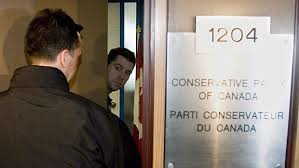 Raid on Conservative Party offices” Elections Canada wanted data. For one thing the process is flawed. Everyone knows that the PM has been engaging in a war with Elections Canada – ever since they nailed him on his party’s in-and-out funding scandal. Why would anyone expect him to be impartial? Shouldn’t something as important as changing our electoral process be managed by an independent body, rather than at the whim of one of the political parties? Why were there no consultations prior to introducing the Bill – not with the other political parties, not with the public and not even with Elections Canada, who might know a thing or two about elections?
Elections Canada’s mandate currently includes encouraging more people to vote. We understand that democracy works best when more citizens are involved. But this Bill would diminish that objective and further suppress voting by removing ‘vouching’, which was used without issue by thousands of voters in the last election. The government claims ‘vouching’is problematic, and there may be better ways to assist those without adequate ID to secure their right to the ballot box. But just excluding voters without adequate identification is throwing out the baby with the bath water. And, critics say the minister proposing this change is wrong – hasn’t done his homework.
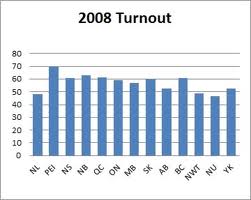 Not terrible numbers – but they should be higher – 70% across the country. Some nations, like Australia, legally require their citizens to vote; why would we want to do anything to suppress voting, to discourage people from exercising their franchise? If one wants to vote in Australia and isn’t carrying the right identification they can just swear an oath and declare their right to get a ballot. Further, shouldn’t we be finding more inclusive ways of voting, like internet voting to facilitate and enable more of our youth to participate in the democratic process? We do internet banking don’t we? Surely, we can manage the process of issuing secure ‘pin’numbers.
For a number of years Canada’s official political parties received direct public funding, the amount dependent on how well they had performed in the previous election. This reduced the influence of money, and the power of wealthy contributors, in shaping government policy. Germany, Sweden, Israel, Australia, Austria and Spain are among the growing number of countries with public funding, now representing over half of those with elected democracies. US presidential candidates may elect for public finding. And just to be clear, note that we subsidize political parties with the public purse anyway – through tax-deductible donations.
Mr. Harper, when leading his minority government, eliminated corporate and union funding and reduced the individual contribution limits to $1000, keeping his earlier election promise. And it was relatively easy for him since the Conservatives are more effective at attracting individual donations than the other parties. Then, after gaining his majority, he cancelled the public funding program to solidify his private funding advantage. And the new Bill would raise that individual donation limit by a whacking 50%. The Bill, for some bizarre reason the government has difficulty explaining, also exempts political parties from spending limits for fund-raising activities.
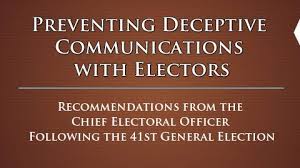 The report had to be one of the most embarrassing for a democracy For something labelled Fair Elections Act, the Bill fails to improve fairness in any meaningful way, such as giving Elections Canada the power to investigate political parties and compel testimony of those suspected of committing transgressions. This limitation came to light with the Robocalls scandal, in which the Tories were also implicated. To make it even more difficult for irregularities to be uncovered and those guilty penalized, the Bill shifts that responsibility to a partisan minister (attorney general), and muzzles the politically impartial Elections Canada which reports to Parliament as a whole.
And wouldn’t something called Fair Elections deal with the unfairness of the first-past-the-post (FPP) system in our problematic multi-party environment – one that enables a PM winning less than 40% of the popular vote to rule the country at his/her pleasure for a full unfettered four years. New Zealand, Germany and a host of other nations use a proportional electoral system, where some of the MPs are chosen FPP and the others appointed by the relevant political parties based on their share of the popular vote. The results for these nations have been generally positive with less violent swings in public policy.
 The Green Party and NDP are big supporters of proportional representation. The Liberals are promoting a preferential system that would ensure future governments are elected by at least half the voters. Toronto city voters may use a similar system in this year’s mayoral election. Voters would rank candidates, and the second and third choices of the lowest scoring candidates would get added to the highest scoring candidates’tallies – until one has emerged with over 50% support. The Green Party and NDP are big supporters of proportional representation. The Liberals are promoting a preferential system that would ensure future governments are elected by at least half the voters. Toronto city voters may use a similar system in this year’s mayoral election. Voters would rank candidates, and the second and third choices of the lowest scoring candidates would get added to the highest scoring candidates’tallies – until one has emerged with over 50% support.
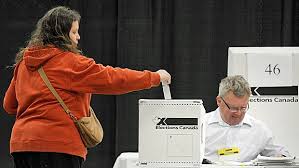 It is about one person, one vote by an informed voter. In the end, democracy is about representing the public will. It is unfair to be subjected to the ideological whims of a political party, be it right or left-wing, which came to power with the support of less than half of the electors, let alone 38%. Fixing that irregularly would be a worthwhile endeavour. Otherwise, calling this Bill the ‘Fair Elections Act’is a huge misnomer. It is nothing more than a crude attempt to break and handicap what seems to be working just fine.
Background links:
Fair Elections Act Elections Canada Implications More Implications Ranked Voting Conservatives Muzzling
Elections Act Critics NDP Tour on Elections Act Kill This Bill Government Strikes Back Voter Fraud Real Problems

 By Pepper Parr By Pepper Parr
March 23, 2014
BURLINGTON, ON.
Point: Notices were mailed to all the people in the rural community about a meeting to consider the idea of a special cultural/heritage district, unfortunately they went out a couple of days after the event. Turnout was less than expected.
Point: The city posts all kinds of detail on its website and develops stories encouraging people to consider running for public office – but, for reasons which were never made clear, they took down that portion of the web site that had all the financial returns from the 2010 municipal election.
The financial return is the document that sets out how much money each candidate raised, who the donours were and what the funds raised were spent on. Vital information for anyone who decides they want to run against an incumbent.
The documents have since been put back up on the city website. Why were they taken down and who made that decision?
 Public input on the budget was limited to an overview and a workbook people could make comments in. Point: The city holds a public meeting on the budget the finance department has prepared. While there is just the one meeting held in the downtown core, it is well attended and staff are very attentive in answering questions. There is talk of plans for additional public meetings in 2015 in the Dundas part of town now that the Alton campus is operational.
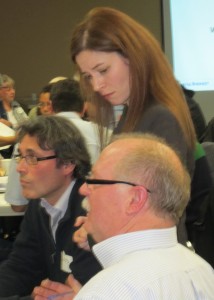 The city had very competent staff on hand at public sessions to answer questions – on decisions that had already been made. Vanessa Warren, one of the people who led the public reaction to the dumping of landfill on the airpark site on Appleby Line, asked why the city was coming to the public with spending that was already decided on. She wanted to know why the public wasn’t being asked how it wanted its money spent BEFORE decisions were made.
City manager Jeff Fielding, would dearly love to have feedback from the public on key issues and has devoted a significant part of the budget he has to run his office to a process that he hopes will give him almost instant access to a panel of people who can answers questions. The unfortunate part of this $100,000 + expense is that the public response has not been overwhelming – there were less than 500 people on the panel at last count.
It is a two-sided coin – the public wants information – well the more vocal part of the public wants more information, and the city is being moved in a direction where public input will be critical. Getting to a point where what the public wants and what the city would like is the challenge for the city.
Back in 2010 the late John Boich and former Mayor Walter Mulkewich authored the Shape Burlington report in which they identified an “information deficit” in the city. City hall didn’t take all that kindly to the report – a report on which they haven’t responded to all that well since its publication even though city council voted unanimously to support the document.
 Boich and Mulkewich recommend that there be a Citizens charter – a document that sets out what every citizen can expect from the city. There is such a document but you would be very hard pressed to find the thing on the web site and the “implementation plan” for that document has yet to be completed. Boich and Mulkewich recommend that there be a Citizens charter – a document that sets out what every citizen can expect from the city. There is such a document but you would be very hard pressed to find the thing on the web site and the “implementation plan” for that document has yet to be completed.
Would it be fair to say that the administration at city hall isn’t really behind the concept of a charter other than collecting data and then doing nothing with it?
There is a demographic divide at city hall – both within the administration and at the council level. There are people in the planning department and over at finance who genuinely want the public to know what is being done and are eager to hear what people have to say.
The city manager certainly wants public input and is delighted when he meets people who can help him determine the public will. However, getting all of his senior team onside has been and is continuing to be a challenge.
There is an item on a Standing Committee agenda somewhere in the works that will discuss the Community Engagement plans; this doesn’t appear to be a priority item but then real community engagement has never been a priority for this city.
Two of the current city council members were on the Shape Burlington committee – one would think they would be chomping at the bit regularly to get some movement on the Citizen’s charter. Both Councillors Blair Lancaster, ward 6 and Paul Sharman, ward 5 have said very little about this during their term of office.
It is going to take a city council with a younger, more committed demographic to bring about any change.
 There are a few, precious few, on council who want to hear what their constituents think and treat those people who write out their delegation and trudge over to city hall and take the time to make their point of view known. Yes, there are people whose delegations are sometimes poorly prepared and on other occasions delivered in a less than respectful manner. But there have been a number of excellent delegations that have resulted in a change. There are a few, precious few, on council who want to hear what their constituents think and treat those people who write out their delegation and trudge over to city hall and take the time to make their point of view known. Yes, there are people whose delegations are sometimes poorly prepared and on other occasions delivered in a less than respectful manner. But there have been a number of excellent delegations that have resulted in a change.
On many occasions city council is hearing from people who are angry, mad and upset. Their council is making decisions they don’t like about the place they call home. Look at the 250+ people who were opposed to the building of a six storey apartment building on New Street – they just didn’t want to see that kind of change in their neighbourhood. They said they could live with four storey but other than Councillor Meed Ward, who asked some very pointed questions and got mushy answers, no one explained why a four storey structure couldn’t be built.
The city did nothing to educate that public. Sure, public meetings were held but there was not very much that was educational about those events. Usually a planner representing the interests of a developer is explaining what they have already decided to do.
Could the planning department not think in terms of putting in place a process whereby staff review an application and decide at that very early stage if some public education is necessary? Then assemble a team of people who would put together an outline of all the up sides and down sides of the development – cover everything and prepare a public for the change coming their way.
Ken Greenberg, a noted planner was brought to Burlington as part of the Mayor’s Inspire series. He explained how in Toronto developers first went to the community with their ideas and looked for buy in at that level before they put as much as a pencil to a piece of paper
 Greenberg told the Burlington audience that this approach gave the developers a clear sense of what the community would tolerate and gave the community an opportunity to have their ideas seriously considered before anything went too far. Greenberg told the Burlington audience that this approach gave the developers a clear sense of what the community would tolerate and gave the community an opportunity to have their ideas seriously considered before anything went too far.
What Burlington is looking for is a way to move forward with developments and at the same time find a way to effectively communicate with the tax payers. We’ve not managed to do that – so far.
But there is hope – the proposal to do something to further protect the rural part of Burlington plans on having very significant community involvement. More about that proposal later.

 By Pepper Parr By Pepper Parr
March 21, 2014
BURLINGTON, ON.
The media release said the province was going to freeze MPP salaries until the provincial budget is balanced. Sounded reasonable – but the news release didn’t say how much MPP’s are paid now nor did it make any mention of the allowances and perks they get.
The pay freeze, if it passes, would extend the current freeze on MPP salaries until the provincial budget is balanced in 2017-18. The MPP Salary Freeze Act would not allow pay increases to take effect until April 1, 2019, after the Public Accounts confirm a balanced budget.
Compensation costs account for over half of all Ontario government spending, either paid directly through the Ontario Public Service or as part of the government’s transfer payments to universities, hospitals and other public sector partners.
The government has identified the management of public sector compensation as an important part of its plan to control costs while also maintaining public services that families rely on like health care and education.
In 2004, a salary freeze for MPPs was implemented from October 2003 until April 1, 2005.
The 2009 budget announced that MPP salaries would be frozen for one year beginning on April 1, 2009. That salary freeze was extended in the 2010 budget for two years and in the 2012 budget for an additional two years, bringing the total length of the current pay freeze to five years.
The media release makes no mention of any increase between April 2005 and 2009. It is the decision to be selective with the information that is given out that ticks off the public. The men and women who serve as MPP’s are entitled to a decent wage and a pension plan plus expenses that they incur when they do their jobs.
The Burlington MPP gets an allowance to pay for accommodation in Toronto for those evenings when the legislature runs late. It’s a 45 minute drive from Queen’s Park to Burlington – no need for the cost of an apartment to stay over. If a session runs really, really late – OK let the MPP get reimbursed for a hotel room – a moderately priced hotel room if you don’t mind.
We would love to know how often MPP Jane McKenna stays overnight in Toronto and how often members of her family use the apartment when they are in Toronto. Same goes for how often Ted Chudleigh, the Halton MPP stays in Toronto.
In 1996, the defined benefit pension plan for MPPs was wound up and members and beneficiaries were paid the value of the benefits earned to that date. MPPs now have a defined contribution pension plan.
Since 2009, Ontario has initiated compensation restraint measures for members of the Ontario public sector and broader public sector, and has indicated that compensation costs must be managed within Ontario’s existing fiscal framework.
Ontario public sector wage settlements continue to be below the average of private sector, municipal sector and federal public sector settlements.
Tax payers want a government that they see as people looking out for the interests of the public. We frequently hear people running for election say it is an honour to serve the pubic – that tends to stick in the throat when we read about the massive cost of WORD of shutting down the construction of two gas plants before the last election and then reading details of the amounts paid to consultants and law firms to handle the shut down and then learning that documents critical to an honest investigation of who did what when are no longer available – erased from hard drives on computers.
These politicians toss around the loss at more than $1 billion – a BILLION – most of us have to pause to figure out how many zeroes that is.
The current Premier seems like a decent hard-working woman; she is certainly out there working hard. But one could have, and many people said the same thing about former Premier Dalton McGuinty who resigned as Premier on really short notice.
We need government – and the people who do that work are entitled to good incomes. It is hard work and they are in the public eye almost every hour of every day.
We just want better value for the money we have to spend.
Burlington currently has its own little employee perk problem. City hall staff get free parking which comes in at about a quarter of a million a year. How many people get their parking paid for by their employer?
When ward 2 Councillor Marianne Meed Ward brought this up during the budget deliberations there wasn’t a line up of council members ready to support her position. The city manager said at the time that what Meed Ward had brought to council appeared to have merit. Jeff Fielding doesn’t use language like that lightly. Most of the Council members wanted to see a detailed report on what the city was required to do if in fact paid parking was a taxable benefit. They all voted to have a report prepared – but there was not date set as to when that report would come back to council.
An opportunity to lead was missed – by ever one of the except for Councillor Meed Ward. Councillors Craven, Taylor, Dennison, Sharma and Lancaster as well as the Mayor punted the ball back to staff – they very people who enjoy the benefit. Anyone of the six could have said: If this is a problem we need to fix it quickly. Instead they put made sure the funds to pay for that free parking came out of the tax revenue account and into the parking revenue you account where it is then used to pay for the free parking.
The city finance department should have known if the benefit was taxable or not and brought a recommendation to council.
It’s exasperating.

 By Ray Rivers By Ray Rivers
March 20, 2014
BURLINGTON, ON.
Another day, another free trade deal. Canada has landed what is being called a big one, this time with South Korea. Promoted by both Liberal and Conservative governments, these trade deals have inadvertently contributed to the de-industrialization of Canada.
Recall the sound of doors closing and windows being shuttered as the ink was drying on our first trade deal, the Canada-US FTA. Many of Ontario’s small and medium manufacturing enterprises, acting like characters in a Steinbeck novel, packed up and moved to larger markets, a warmer climate and the lower wage rates south of the border.
Former Ontario premier, David Peterson, had predicted that a quarter of a million jobs would be lost to FTA, and indeed, unemployment in Ontario more than doubled as its manufacturing sector took the hit. And then there was NAFTA. The Economic Policy Institute, a research think-tank in the US, estimated that by 2010 NAFTA had lost 700,000 US jobs to Mexico. It is worth recalling US presidential candidate Ross Perot and his famous prediction of a ‘giant sucking sound’, as American jobs rushed off to Mexico.
Free trade is just another economic theory. Hypothetical notions of absolute and comparative advantage sound logical on paper. But, the reality can be so different, particularly if the playing field is uneven, if your trading partners don’t play fair. South Korea is one of those nations which adjusts its exchange rates to make their exports competitive, and the nation employs a raft of non-tariff barriers to discourage its citizens from buying foreign goods.
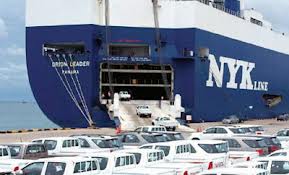 Cars being loaded on to ship for transportation to North America. with tariff removed many of those cars will come to Canada. The Korean deal is being sold as offering greater access to the Korean market for Canadian beef and pork, but even the government accepts that Canadian manufacturing, and auto making in particular will be hit by this deal. The US signed a trade deal, just last year, with South Korea (KORUS FTA) and their experience was that the US lost 40,000 jobs, and its historical trade surplus with Korea was turned into a substantial deficit.
Ford Motor Company, whose US parent had not initially objected to the KORUS FTA, pointed out this sad experience to the Canadian government just as we were putting the seal on our own trade deal. The PM’s response was a sharp rebuke to the manufacturing giant, accusing Ford of ‘duplicity’. Ford is Canada’s largest auto maker, employing about eight thousand people in Ontario and responsible for substantial spin-off employment, mainly in Ontario. Currently about a half million Canadians are employed in the auto industry, with fully a third of those in manufacturing. All Korean-made cars are imported into Canada.
Another potentially impacted auto-maker, Fiat-Chrysler, had been in discussions with the federal and provincial governments over financial support to help it expand its manufacturing operations in Ontario. Last September Ford had been awarded $140 million in a similar move to help it upgrade its plants. In fact the federal government maintains an open budget allocation just for this purpose. And jurisdictions south of the border have long used grants and loans to attract auto companies and other large employers to their states.
 Will beef actually get from Alberta to South Korea? Before either the federal or provincial governments could officially respond, Ontario’s provincial opposition leader, Tim Hudak, slammed any funding for Chrysler, calling it ‘corporate welfare’, ‘extortion’ and ‘ransom’. Both official levels of government were stunned and Chrysler immediately withdrew its request, claiming that it was not prepared to become a ‘political football’. Mr. Hudak, who is fond of complaining about Ontario losing its industrial base and jobs, needs to reflect on his behaviour and how he has shown himself to be unfit for the job of premier of this province. And his party needs to show him the door before the next provincial election, something a number of PC party members have already contemplated.
There will be winners and losers from this South Korean trade deal. While some beef and pork producers from Ontario and Quebec may see increased sales, most of the meat products will come from the west, primarily Alberta. On the other hand, Ontario auto makers Ford, Chrysler and GM, will los e sales to even cheaper Hyundai and Kia models, depressing both employment and provincial incomes. e sales to even cheaper Hyundai and Kia models, depressing both employment and provincial incomes.
Why would the federal government be so keen on adding more jobs into Alberta’s booming economy and driving up inflationary pressure there? And why are the feds OK with further depressing Ontario’s economy – the latest entry into the economic ‘have-not’club? It makes no economic sense, something that Ford and the Ontario government have been saying. And that is perhaps the reason this South Korean deal, which had been started a decade ago, had been left sitting on the shelf until now.
This is not only bad economic policy, it is patently unfair – unfair that a trade deal will benefit one province, one where the PM happens to reside, at the expense of another. Watching Quebec’s PQ government set the ground work for another sovereignty referendum, perhaps as early as next year, it is useful to reflect on what we tell Quebecers to expect by voting to stay in Canada. If it is not fairness, then what?
Background links:
Premier Peterson US Korean Trade Pact Free Trade and Jobs Auto Sector Worries Harper Slams Ford Harper Takes on Ford
Hudak Slams Chrysler Chrysler Backs Out

 By James smith By James smith
March 16, 2014
BURLINGTON, ON.
The Paddy wagons stand at the ready, I read Halton Police have RIDE checks out on the evenings up to and including March 17th – Saint Patrick’s day. The Police have their job to do, I appreciate what they do, I want them to catch-all the drunks who get behind the wheel. Why do so many people use the Patron Saint of my forefathers as a ready excuse to drink and drive?
Well now, the Irish and the drink eh? A good old cliché and ethnic slur that persists. Lots of examples reinforce this stereotype, Oscar Wilde’s old chestnut of “work being the curse of the drinking class” comes to mind but Ireland’s most famous imbiber- Brendan Behan went one better when he said he was “a drinker with a writing problem”. The Irish men of letters aside, the multi-national booze biz can’t but help themselves, they crank out yet another excuse to get pie-eyed on March 17. Why sure, everyone loves a happy drunk leprechaun right? Have a black and tan, an Irish coffee, a black beer that starts with the letter G or mass quantities of industrial suds from a Brazilian brewer tinted green to kill the taste of genetically modified high fructose corn syrup! But hey! don’t matter if you’re Sullivan, Silverman, Schultz, Singh, or Sanchez, on March 17th everyone is Irish don’t you know it. We’re all encouraged by these vipers to act like “amadans” and drink up to prove it.
The fact of the matter is the booz-up that’s become “ST PADDYS DAY” is starting to get my Irish temper up. A temper that got me in a little bit of hot water when the chair of a Committee of Burlington City Council had to put me in my place just a few weeks ago. I’m sure most of the four and one half million Canadians like me claim Irish decent feel the same way. Sure we want to celebrate our heritage on the 17th by wearing green, and having Jig’s Supper, and yes, we may raise a jar or two. Bur many who cheered Brian O’Driscoll’s team winning the Six Nations Saturday are frankly tired of and ashamed of our heritage being mixed up with drinking contests and other shenanigans that end in fights and green regurgitation. As a son of the land of saints and scholars I’d rather remember the thousands who died at Grosse Isle Quebec, Ireland Park Toronto or Middle Island New Brunswick. I’d rather we celebrate Irish Canadians like Bishop Michael Power, Father of Confederation Thomas D’Arcy McGee, Prime Ministers John Thompson, Brian Mulroney, and Paul Martin. Those in the arts like authors Morley Callahan, W. P Kinsella, actors like Katherine O’Hara, and Martin Short. Musicians like Stomp’n Tom and Alan Doyle and composer Timothy Sullivan. In Burlington, we have many outstanding Irish, the well-known Torsney family come to readily mind, but there are many many more.
Don’t get me wrong, I’m no tea totaler, and booze, has done its share of damage to people in my family over the generations, but As a dogan, I resent the premise that March 17th means get your beer glasses on. So I have a better idea: In the future lets blame the ides of March (March 15th) or Pi Day (3.14 hey & next year it’s even 3.14.15!) for drunk and disorderly conduct in the middle of March. As the Feast of Saint Patrick always falls within the season of lent, let’s take some advise from that good Irishman Pope Francis’s – this Saint Patrick’s day, take some of the money you might otherwise spend on John Barley Corn and donate it to some of those most in need.
Amadan: A band, originally based in Corvallis, Oregon, plays both punk and world music. They are often categorized as a Celtic punk band due to their Irish influences. Amadán is also a Gaelic and Hiberno-English term for a stupid man.

 By Pepper Parr By Pepper Parr
March 15th, 2014
BURLINGTON, ON.
Still quiet on the municipal election front. No Ides of March for the Mayor of this city.
To date just one of the incumbent members of city council has filed nomination papers – Mayor Goldring scooted downstairs from his eighth floor office and gave the city clerk his fee early in January – and his hat was in the ring.
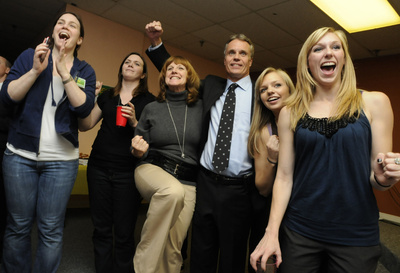 The Goldring family whoops it up the night of the 2010 election. Same scene for 2014? The Mayor didn’t stop there. He recently held an impressive fund-raiser – a reported 125 people at $100 a pop attended where we understand His Worship announced that Cheryl Taylor will lead the campaign with Jim Matts doing much of the grunt work the way he did last time out.
So far there isn’t a second candidate for the job ready to declare for the top spot. None of the other council members who are warming a seat at the horseshoe in the council chamber have declared yet, however all, except for Dennison have said they want to return and the Mayor has said he would like to see all his colleagues returned. They might be waiting until the Premier decides if there is going to be a provincial election and if she does ask the Lieutenant Governor to issue an election writ – they may all stay inside until that wind blows over.
Ward 1 Councillor did say at a meeting at the Conservation Halton offices that he had thought about running for the office of Mayor. “It’s not out of the question” was his comment at the time.
We can report that there are very credible candidates in wards 5 and 6 getting their ducks lined up – expect at least one very interesting candidate to step forward out of rural Burlington. It’s about time those people had someone representing their interests at the table.
There are now candidates in ward 1 – two of them so far, no one in ward 2 yet; Meed Ward might well be acclaimed in ward 2, unless of course she decides now is the time to run for the office of Mayor. It’s the only chance she has of winning that office which she has wanted from the day she first ran against Rick Craven in Ward 1 back in 2006.
Meed Ward has a hard political calculation to make. Run again in ward 2 and win hands down but find herself facing a formidable candidate in 2018 if Frank McKeown runs in ward 4 – which is not out of the question yet. McKeown apparently has a promise from Jack Dennison, the ward 4 incumbent to campaign with McKeown if he runs. Not exactly a promise you can take to the bank.
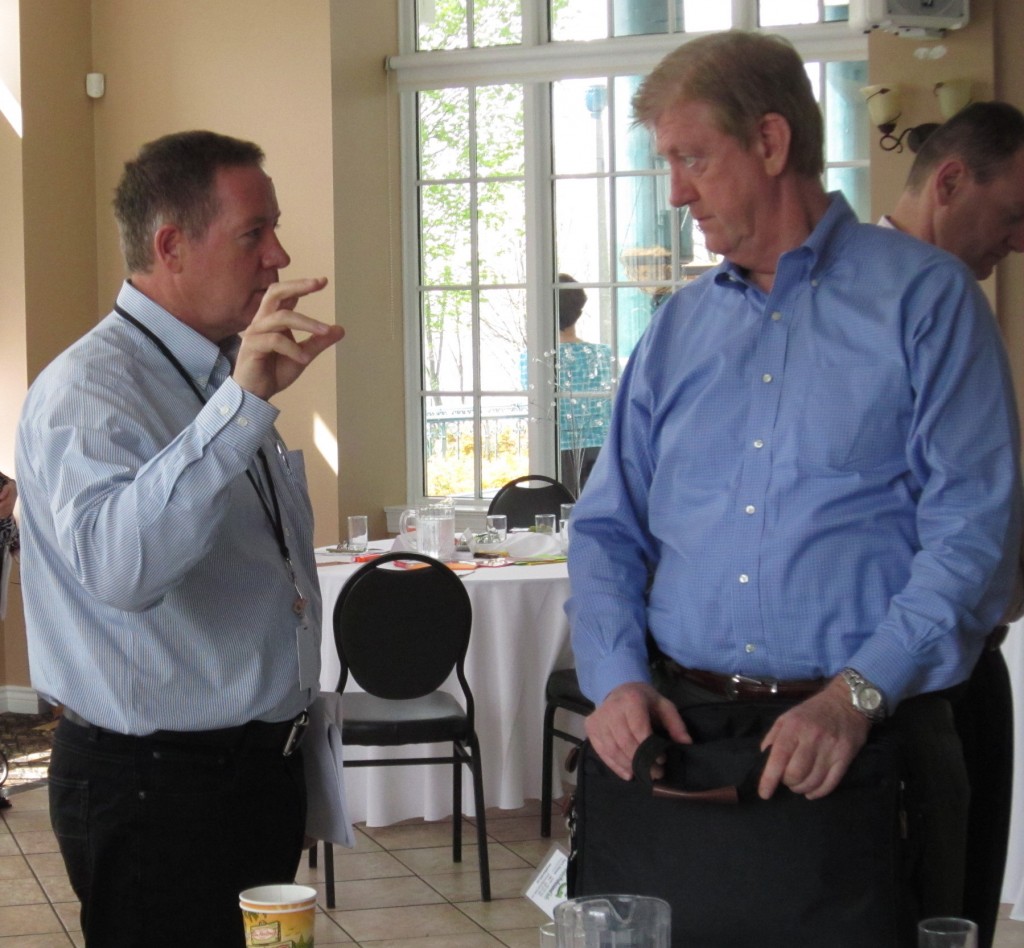 Frank McKeown, then the Mayors Chief of Staff explains a concept to Ward 5 Councillor Paul Sharman. McKeown was described as the 7th council member during the Strategic Plan sessions. McKeown might decide that he doesn’t want to serve as a council member for four years and then run for Mayor – he might decide to just go for the brass ring now. Many felt that McKeown was the thinker behind the Mayor when he ran against Cam Jackson in 2010. Most of the position papers Goldring released were reportedly written by McKeown.
During the more than six half day meetings on the development of the Strategic Plan McKeown was frequently referred to as the “seventh council member” – not always politely by the way. He brought a level of sophistication to the discussions that was badly needed at the time.
There was not a lot of love lost when McKeown advised the Mayor in July of 2012 that he was going to resign effective the end of the year. That gave the Mayor plenty of time to find a new Chief of Staff. The replacement was certainly no Frank McKeown. It will be interesting to see what the Mayor comes up with in terms of an election platform and if he issues any quality position papers this time out. Will there be a reference to his One Vision debacle?
We hear that the “Duffster” – that being John Duff, might be asked to handle media buys and campaign literature design for the Mayor. (We incorrectly called Duff – Duffy in an article recently – that was fixed.)
Martin von Zon of Intercom Marketing was going to do that job but he then won an RFP to do some work for the Performing Arts Centre and felt he might have a conflict of interest if he did any work for the Mayor while performing a service for the PAC. People in this town certainly have a very narrow definition of just what a conflict of interest is – Jack Dennison certainly doesn’t define conflict quite as narrowly.
One has to wonder if van Von has his ear closer to the ground than most and is picking up vibes others are not aware of? – and if that is really the reason for declining. Van Von certainly didn’t get the PAC contract because of the Mayor.
Ward 1has two nomination; Jason Boelhouwer and Catherine Henshell.
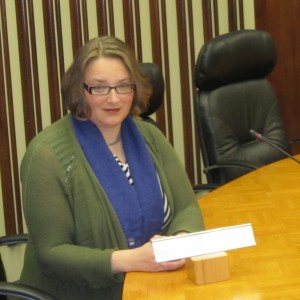 Catherine Henshell has her eye on the council seat for Ward 1 Ward 2 is closed territory unless there is someone who wants to create some name recognition and get a chance to rake Councillor Marianne Meed Ward over the coals. She will win that race unless she is found at the end of the pier under a full moon howling into the night sky – and even then she might still win.
There is one declared candidate in Ward 3; Lisa Cooper filed her papers and hasn’t been heard from since.
 Alexa Kubrak once put together some ideas on re-branding for the Burlington Art Centre. Got stiffed and decided the only way to make a difference was to be at the council table. running in ward 4 where the incumbent has yet to declare. Ward 4 has been busy; while incumbent Dennison hasn’t declared – and may not – three others Have. John Sweeny, a former Deloitte business development executive, Steve Kempf who lives on Indian Road, outside the ward and Alexandra Kubrak, a young entrepreneur who may lack experience but is a bright young lady – all have their hats in the ring.
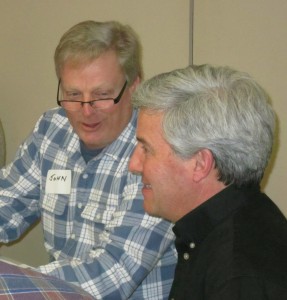 John Sweeney running in ward 4 takes part in public budget discussions. Ward 5 has yet to hear from incumbent Paul Sharman but expect him to be in the race – he has nowhere else to go. There is another candidate doing the final touches to his campaign website – look for an announcement very early in April – hopefully not April 1st. Ian Simpson has also declared in ward 5.
Ward 6, which had the tightest race in 2010 when Blair Lancaster beat Mark Carr by a slim 125 votes, will face a very strong contender expected to announce early in April. There is a declared candidate in the ring now – real estate broker Jim Curran announced earlier this month.
Still a lot of fence-sitting going on. For those who want to run for office and be seen as serious get along to the Clerk’s office. For those that have declared – begin getting your message out.
Background links:
Mayor satisfied with his first term
Catherine Henshell files nomination papers for Ward 1
Jason Boelhouwer announces his candidacy in Ward 1
John Sweeney will run in Ward 4
Alexandra Kubrak will be running in Ward 4

 By Ray Rivers By Ray Rivers
March 12, 2014
BURLINGTON, ON.
Canada was one of the first nations to respond to the civil unrest in Kiev and the Russian invasion of Crimea. We recalled our ambassador to Russia, dispatched foreign minister Baird to visit Kiev, booted out a few Russian soldiers visiting us, offered a tiny amount of economic and humanitarian aid and sent over a couple of military observers. This was all announced with the sober deportment which Mr. Harper so capably captures.
 There is a strong, vibrant Ukrainian community in Canada – a voting block if there ever was one. The reaction from the substantial Ukrainian diaspora in this country was positive, but they know just what he is doing. They understand this is what good politicians do to sway a potential ethnic voting block into their partisan camp. And it’s not that Mr. Harper couldn’t have done more if he really wanted to pour his love on Ukraine. For example, the financial aid he offered for that economically devastated nation of forty-six million people is an embarrassingly paltry sum. This is from a Canadian government that doesn’t think twice about dumping a couple million bucks advertising a non-existent job training program.
 Once considered the bread basket of Europe – the country is now an economic basket case. The Ukrainian situation is complicated. Once considered the bread-basket of Europe, the Ukraine has become an economic basket-case, caught between an ever-expanding EU and a newly oil-rich Russia intent on re-establishing the old Soviet Union. It is one of the ironies of civilization that the Ukraine is caught in this potentially matricidal tragedy, having been the cradle of birth for the Russian people. For most of its forty-four thousand-year history the Ukrainian people were made captive by any and all invaders, including Huns, Mongols and Turks, the Poles and Swedish Deluge, the Austrian-Hungarian empire, Hitler and most recently the USSR, where it acquired its current geographical dimensions.
Crimea will become part of the Russian Federation, every reasonable person sees that inevitability. The question is whether Russia is content with its acquisition of this tiny peninsula, or whether it will find pretext to invade other parts of the Ukraine. The entire western effort focused on Crimea is about keeping Mr. Putin’s attention there. This hopefully will stall him in order for the Ukrainians to assemble enough of a defence to hold onto the rest of their country.
Mr. Putin is upset. His dreams of expansion have been set back by the impending Ukrainian decision to favour the EU over his dream of a new USSR. It is truly unfortunate that the west didn’t have the foresight to envision this situation. It might have been possible to more fully invite Russia into the European community of nations, such that Mr. Putin would not feel threatened by a pro-west Ukraine. Russia faces the reality of having lost all of its former Warsaw Pact satellites to the EU, and more importantly to NATO. From Putin’s perspective securing his military base in Crimea was the very minimum he should do.
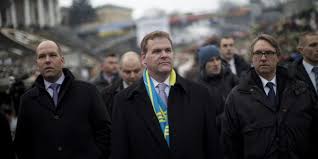 Canadian Foreign Affairs Minister Baird has traveled to Kiev and worn the colours of the Ukrainian state. There was a time when Canada was viewed as an honest broker. Lester Pearson won the Nobel Peace prize in 1957, for his trusted independent voice of reason. Today Canada’s foreign policy is about marketing our natural resources, and shamelessly pandering to the ethnic vote back home. So nobody listens to us anymore, and certainly not Mr. Putin. For all the PM’s bluster about the invasion of Crimea, Canada’s only substantial contribution will be through NATO action, should that become necessary.
But we should not deprecate the fact that we were among the first to get involved. We closed our embassy to register our disapproval at the slaughter of protesters. Then, following the flight of besieged president Yanukoyvich, we provided early moral support for the new administration in Kiev, Mr. Harper has a habit of jumping into situations early and this time he got it right and demonstrated leadership.
And there is a lesson from Crimea for Mr. Harper – in fact for all of us. Quebec having just announced elections is busy preparing for its new sovereignty referendum, should the PQ win. In response, it appears the PM has come to life, and begun meeting with parliamentary opposition leaders and provincial premiers about his next steps. After all Crimea’s future in the Ukraine will be determined by a unilateral referendum, not unlike those used in the last two Quebec votes on sovereignty.
As we see in Crimea, events can move quickly. So it is prudent for the PM to at least ponder the imponderables, knowing there is a probability they could become reality in the event of a strong majority vote for sovereignty. For example the northern aboriginals in Quebec, whose treaties are with Canada, may wish to stay in Canada – to separate from a separate Quebec. Would the rest of Canada support them, militarily if necessary? Would there be involvement by other nations – the USA or France? Oh what a tangled web they’ll weave – and all they want is to secede.
 Ray Rivers writes weekly on both federal and provincial politics, applying his more than 25 years as a federal bureaucrat to his thinking. Rivers was a candidate for provincial office in Burlington where he ran against Cam Jackson in 1995, the year Mike Harris and the Common Sense Revolution swept the province. He developed the current policy process for the Ontario Liberal Party. Ray Rivers writes weekly on both federal and provincial politics, applying his more than 25 years as a federal bureaucrat to his thinking. Rivers was a candidate for provincial office in Burlington where he ran against Cam Jackson in 1995, the year Mike Harris and the Common Sense Revolution swept the province. He developed the current policy process for the Ontario Liberal Party.
Background links:
Canada’s Ukraine Contribution
Russia vs Nazis Legal Issues in Ukraine Russian View Kissinger Ukrainian Feed Mulroney on Putin
Losing Putin Russia Lost the War Ukrainian Diaspora Ukraine History Yanukoyvich Corruption
The Crimea Case

 By Emily Ferguson By Emily Ferguson
March 8, 2014
BURLINGTON, ON.
My name is Emily Ferguson and I am the sole individual behind Line 9 Communities. (This is a blog Ferguson writes about the communities along the path of the Enbridge Pipe Line 9 that runs from Sarnia to Montreal.)
I graduated from McMaster University with Honours BA Geography & Environmental Studies and a minor in Political Science.
 Emily Ferguson mapped every yard of the pipeline so that communities along its path could know just what was beneath the ground. I first heard about Line 9 at a climate conference in Ottawa in 2012. My interest led me to attend information sessions in Hamilton and surrounding area in early 2013. At one meeting in particular, I asked for a Line 9 information package which had been provided to Council. Although there were extra packages after the meeting, an Enbridge official denied my request and asked “Who are you working for”? The Enbridge team then proceeded to ask myself and a fellow community member for our driver’s licenses and said they would mail a package. Something about the encounter just didn’t feel right and we walked away without the information.
 Emily Ferguson – National Energy Board intervener, geographer. That was the turning point. I went home that night with so many questions. Why was I being denied access to information at a public meeting? What were they trying to hide? Why didn’t they want me to know where the pipeline was?
So I took it upon myself to map Line 9. Throughout an unimaginable number of late nights, I compiled satellite images, integrity data and publicly available information to create detailed maps of the 639 km pipeline.
I did it because they said no.
I did it because I felt the need to inform the public.
If Enbridge wasn’t going to adequately consult … who would?
 For Burlington – this is where the pipeline was located. I contacted multiple City Counselors along the line and sat down over coffee with many to discuss the proposal. The lack of information provided to municipalities shocked me. I proceeded to canvass neighbourhoods along the line to poll residents and provide details about open houses and how to get involved.
Line 9 Communities gained instant attraction. Although I blogged about the application, past spills, and changes to federal legislation, viewers wanted one thing … MAPS! Essentially they wanted to know, where is the pipeline and why don’t I know about it?
 Emily Ferguson mapped ever foot of the pipeline from Hamilton to Montreal and learned that the thing ran underground right behind her elementary school – the pipeline had always been a part of her life – She didn’t even know it was there. During the map creation, I found out that Line 9 crosses right through the small community where I grew up. The pipeline is located directly behind my public school playground in Glenburnie, ON, just north of Kingston. It also passes behind Seneca College in Toronto which I attended for three years. I had literally been living beside the line my entire life … and didn’t even know it existed. All of a sudden, things became very personal.
I felt compelled to learn everything I could about the project. My biggest supporter along the way was Eva Simkins – my Grandma. Although diagnosed with cancer in 2009, two weeks of radiation treatments gave us the gift of four extremely memorable years. We traveled, talked politics, did puzzles, celebrated, smiled and laughed. Through it all though, I knew there was that big question in her mind. Why me?
I wondered the same thing.
She held my hand as she peacefully passed away at sunrise on Earth Day of this year … just three days after I applied to be an NEB Intervener.
In my opinion, we accept the status quo far too often. At a Line 9 open house, an Enbridge official told me, “if we say it’s safe, it’s safe”. But I must question the safety of this pipeline. At almost 40 years old and only meeting the engineering standards of 1971, why is the NEB even considering the application? Enbridge has cited over 400 integrity digs (cracks, corrosion, dents) along the line in 2013 alone! They have also acknowledged that their in-line inspection tools do not detect all defects and that their Edmonton control center cannot sense pin hole leaks. With the current application before the Board, Enbridge is proposing to ship Bakken crude and diluted bitumen laced with drag reducing agent (DRA) chemicals – which include known carcinogens such as benzene – through our communities.
I have never had any malicious intent towards Enbridge. As a citizen of Canada and student of environmental politics, I have always been interested in energy issues, climate change, and a sustainable future for our planet. I believe in the strength of communities working together to achieve great things.
My mission through this entire process has been to raise awareness and promote a community discussion. We are living in a critical time. Will we continue to accept the status quo, or will we start asking the tough questions and demand a better future?
Editor’s note: I had an opportunity to interview Emily while she was thinking about applying to be an intervener at the National energy Board hearing. She wasn’t sure what she was going to do then and she needed quite a bit of encouragement to send in her application, which was an experience in itself. But on October 16th, 2013, Emily Ferguson, all 5’ 2” of her stood before one of the most powerful regulators in the country and gave “the best speech of my life”
Background links:
Burlington doesn’t take to the idea of a change in the flow of the Enbridge pipeline
National Energy Board give Enbridge a green light – with 30 conditions.
The Emily Ferguson maps.

 By Ray Rivers By Ray Rivers
March 6, 2014
BURLINGTON, ON.
There is a whiff of change in the air as the polls place the Trudeau Liberals at the head of the pack racing to the 2015 federal election. It is still early days, but I keep getting asked what I think of Justin Trudeau – is he ready for the job of PM. I met him last year, had a brief chat and gave him a copy of my book (for which he never thanked me). The book has a lot of ink devoted to his father, but he is not mentioned; so perhaps that is why.
 Some people said that he is more like his mother than his father, Pierre the intellectual.
Some people said that he is more like his mother than his father, Pierre the intellectual. If true, I’m not sure if that makes him more or less appealing. His youth is a huge asset, and he has used that to advantage, attracting young voters into the world of politics. A few actually find their ‘salvation’here and become active party supporters, but just getting our youth to the polling booth is a huge public service.
The more traditional wing of the party is comfortable with Trudeau, because of his roots and because they really need a winner after almost a decade in the dugout, and third place at that. And Trudeau understands that, so has taken a moderate, small ‘c’conservative approach in articulating his policies: retaining the Senate, building the middle class, promoting the Keystone XL pipeline, better developing the oil sands, and even more free trade.
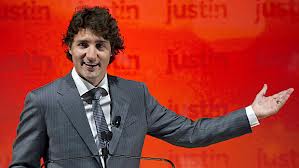 Colourfull – yes. Depth – we don’t know that yet but the signs are good. The Senate decision was a good one. Justin is among the most articulate and communicative of recent Liberal leaders, benefitting in large part from his theatrical training, He claims his campaign is about fairness – and it is a vision which he links to his father’s ‘Just Society’. His opponent on the right has been publicly attacking him over his promise to legalize cannabis. But on this issue, anyway, he sees himself getting on top of the wave sweeping this hemisphere, right behind Mexico and Uruguay and the US states of Colorado and Washington.
Trudeau has also said and done things that have got him into trouble. His joke about Putin and the Ukrainian crisis has handicapped him on that important file. There was his comment about admiring China, about the need for more Quebecers in Parliament, and that whole messy speaking-tour business – which he should have done for free as an elected member.
So is Trudeau ‘ready for the job’? Some said that Joe Clark, Canada’s youngest PM at 40 years, wasn’t ready when he was sworn to the job back in 1979, yet he ably stick-handled the Iran hostage crisis and won the acclaim of the much of the world. Mike Harris used to attack Dalton McGuinty as ‘not up to the job’though McGuinty gave us some of the best government in the province’s history, reconstructing our eroded health care and education systems and balancing three of his budgets before the recession hit – and before he pulled that stunt with the gas plants.
 Pierre shocked many, especially the Monarchists with this stunt in London. Pierre, Justin’s father, was also attacked as immature for some of the antics he pulled, pirouetting behind the Queen’s back, uttering ‘fuddle-duddle in Parliament and giving the finger to the media. But when Canada was facing its greatest national crisis in October 1970, he knew what to do and did it. Experience and training are essential for most careers but there is no apprenticeship for being PM – you either have it or you don’t. So the real question for the pretenders to the throne is what do they stand for, what is their vision and where are they getting their advice.
Mr. Harper threw his closest advisor under the bus after Senate-gate broke, so at least he knows what to do when he gets bad advice. But his vision for Canada is retrograde. Whether it be criminal law, environmental policy, political science, trade and industrial development, or taxation and fiscal policy he represents the past. That isn’t always bad and I do agree with a few of the measures he has introduced since 2006. But if your fantasy is turning the clock back he is your man.
Mr. Mulcair has been very impressive in the House of Commons as a debater representing the official opposition. Probably most people respect his perspectives on social justice and equity and are comfortable with how he has distanced his party from external lobby forces, such as the labour unions. He was a good environment minister in Jean Charest’s Liberal government in Quebec and has a huge electoral base in Canada’s minority language province Quebec.
However, Mulcair has endorsed his party’s policy on Quebec separation, the Sherbrooke Declaration, which would entitle Quebecers voting 51% for sovereignty to begin the process of separation. This was Jack Layton’s legacy, one which had lifted his party to official opposition by playing to the separatists. The Supreme Court has ruled that there needs to be a reasonable majority and nobody except Mulcair and the separatists believes that is 51%. My vision for Canada includes Quebec.
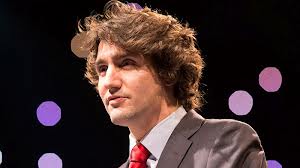 That is big hair. Mr. Trudeau has been Liberal leader for less than a year, so it’s still early to pass judgement on him. And he has been spouting generalities which most people could only agree with: no tax increases for middle class Canadians, politically independent Senators, and legal weed. I know at least one of the good people advising him, and my expectations for a detailed progressive platform in time for the election are pretty high. So maybe the question, come election day, is are we ready for Trudeau, and what he promises – rather than the other way around.
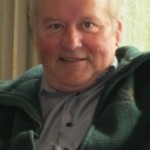 Ray Rivers writes weekly on both federal and provincial politics, applying his more than 25 years as a federal bureaucrat to his thinking. Rivers was a candidate for provincial office in Burlington where he ran against Cam Jackson in 1995, the year Mike Harris and the Common Sense Revolution swept the province. He developed the current policy process for the Ontario Liberal Party. Ray Rivers writes weekly on both federal and provincial politics, applying his more than 25 years as a federal bureaucrat to his thinking. Rivers was a candidate for provincial office in Burlington where he ran against Cam Jackson in 1995, the year Mike Harris and the Common Sense Revolution swept the province. He developed the current policy process for the Ontario Liberal Party.
Background links:
Sherbrooke Declaration

 By Pepper Parr By Pepper Parr
February 28, 2014
BURLINGTON, ON.
My friend Amy Schnurr, Chief Cheese over at Burlington Green, sent me a piece by David Suzuki that made enough sense for me to pass it along. When we great people, we usually ask them how they are doing. Ask a business person how they are doing and they might tell you THE GDP is up and that they are part of it.
Suzuki suggests that measuring progress with GDP is a gross mistake
Governments, media and much of the public are preoccupied with the economy. That means demands such as those for recognition of First Nations treaty rights and environmental protection are often seen as impediments to the goal of maintaining economic growth. The gross domestic product has become a sacred indicator of well-being. Ask corporate CEOs and politicians how they did last year and they’ll refer to the rise or fall of the GDP.
It’s a strange way to measure either economic or social well-being. The GDP was developed as a way to estimate economic activity by measuring the value of all transactions for goods and services. But even Simon Kuznets, an American economist and pioneer of national income measurement, warned in 1934 that such measurements say little about “the welfare of a nation.” He understood there’s more to life than the benefits that come from spending money.
 The GDP: It’s complex, it’s seen as a standard – and it might be totally useless. My wife’s parents have shared our home for 35 years. If we had put them in a care home, the GDP would have grown. In caring for them ourselves we didn’t contribute as much. When my wife left her teaching job at Harvard University to be a full-time volunteer for the David Suzuki Foundation, her GDP contribution fell. Each time we repair and reuse something considered disposable we fail to contribute to the GDP.
To illustrate the GDP’s limitations as an indicator of well-being, suppose a fire breaks out at the Darlington nuclear facility near Toronto and issues a cloud of radioactivity that blows over the city, causing hundreds of cases of radiation sickness. All the ambulances, doctors, medicines and hospital beds will jack up the GDP. And if people die, funeral services, hearses, flowers, gravediggers and lawyers will stimulate GDP growth. In the end, cleaning up the Darlington mess would cost billions and produce a spike in the GDP.
Extreme weather-related events, such as flooding and storms, can also contribute to increases in GDP, as resources are brought in to deal with the mess. Damage done by Hurricanes Katrina and Sandy and the BP oil spill in the Gulf of Mexico added tens of billions to the GDP. If GDP growth is our highest aspiration, we should be praying for more weather catastrophes and oil spills.
The GDP replaced gross national product, which was similar but included international expenditures. In a 1968 speech at the University of Kansas, Robert Kennedy said, “Too much and for too long, we seemed to have surrendered personal excellence and community values in the mere accumulation of material things …Gross national product counts air pollution and cigarette advertising, and ambulances to clear our highways of carnage. It counts special locks for our doors and the jails for the people who break them. It counts the destruction of the redwood and the loss of our natural wonder in chaotic sprawl. It counts napalm and counts nuclear warheads and armored cars for the police to fight the riots in our cities … and the television programs which glorify violence in order to sell toys to our children.
“Yet the gross national product does not allow for the health of our children, the quality of their education or the joy of their play. It does not include the beauty of our poetry or the strength of our marriages, the intelligence of our public debate or the integrity of our public officials. It measures neither our wit nor our courage, neither our wisdom nor our learning, neither our compassion nor our devotion to our country. It measures everything in short, except that which makes life worthwhile.”
We deserve better indicators of societal well-being that extend beyond mere economic growth. Many economists and social scientists are proposing such indicators. Some argue we need a “genuine progress indicator”, which would include environmental and social factors as well as economic wealth. A number of groups, including Friends of the Earth, have suggested an Index of Sustainable Economic Welfare, which would take into account “income inequality, environmental damage, and depletion of environmental assets.” The Kingdom of Bhutan has suggested measuring gross national happiness.
Whatever we come up with, it has to be better than GDP with its absurd emphasis on endless growth on a finite planet.
Thanks for that Amy.

|
|
 By Pepper Parr
By Pepper Parr

















 By Ray Rivers
By Ray Rivers
 But we should not deprecate the fact that we were among the first to get involved.
But we should not deprecate the fact that we were among the first to get involved.
 Ray Rivers writes weekly on both federal and provincial politics, applying his more than 25 years as a federal bureaucrat to his thinking.
Ray Rivers writes weekly on both federal and provincial politics, applying his more than 25 years as a federal bureaucrat to his thinking. By Pepper Parr
By Pepper Parr

 By Ray Rivers
By Ray Rivers

 Ray Rivers writes weekly on both federal and provincial politics, applying his more than 25 years as a federal bureaucrat to his thinking.
Ray Rivers writes weekly on both federal and provincial politics, applying his more than 25 years as a federal bureaucrat to his thinking.




 Back in 2012 the city was given an opportunity to accept an offer from the insurance company that carried the performance bond to assure the completion of the pier.
Back in 2012 the city was given an opportunity to accept an offer from the insurance company that carried the performance bond to assure the completion of the pier.









 The Green Party and NDP are big supporters of proportional representation.
The Green Party and NDP are big supporters of proportional representation.



 Boich and Mulkewich recommend that there be a Citizens charter – a document that sets out what every citizen can expect from the city.
Boich and Mulkewich recommend that there be a Citizens charter – a document that sets out what every citizen can expect from the city. There are a few, precious few, on council who want to hear what their constituents think and treat those people who write out their delegation and trudge over to city hall and take the time to make their point of view known.
There are a few, precious few, on council who want to hear what their constituents think and treat those people who write out their delegation and trudge over to city hall and take the time to make their point of view known. Greenberg told the Burlington audience that this approach gave the developers a clear sense of what the community would tolerate and gave the community an opportunity to have their ideas seriously considered before anything went too far.
Greenberg told the Burlington audience that this approach gave the developers a clear sense of what the community would tolerate and gave the community an opportunity to have their ideas seriously considered before anything went too far.



 e sales to even cheaper Hyundai and Kia models, depressing both employment and provincial incomes.
e sales to even cheaper Hyundai and Kia models, depressing both employment and provincial incomes.


























